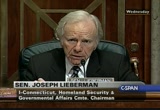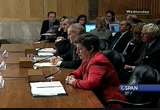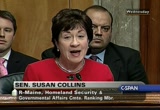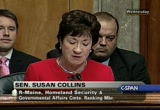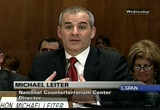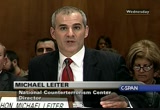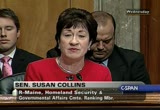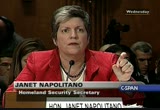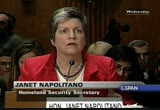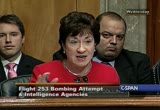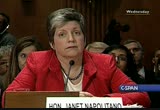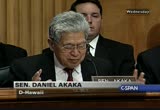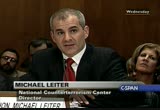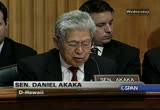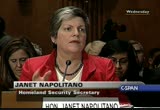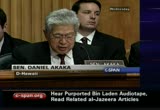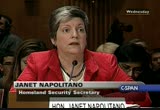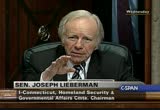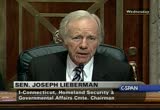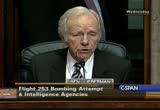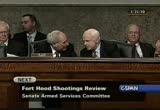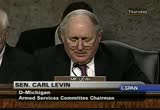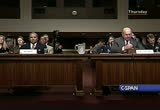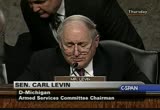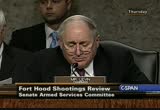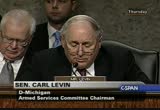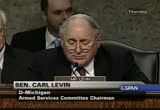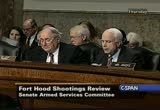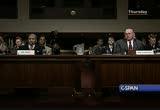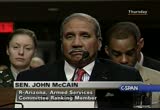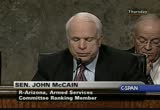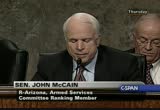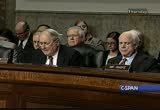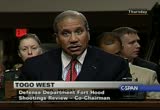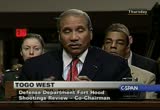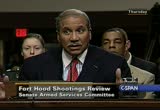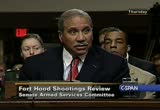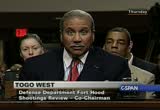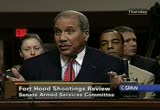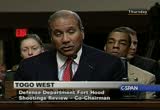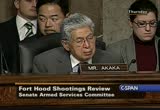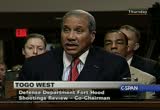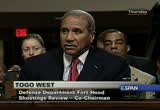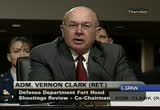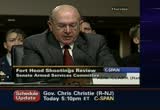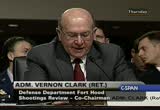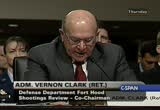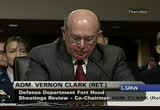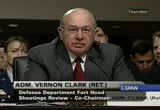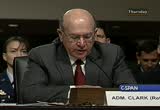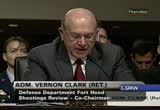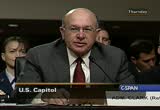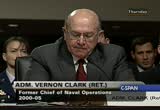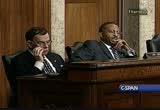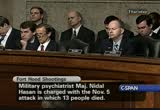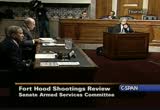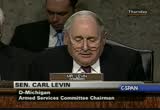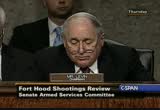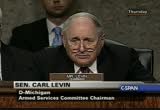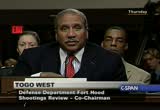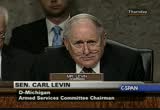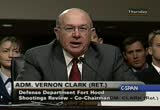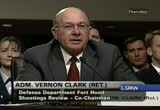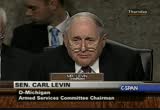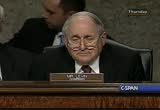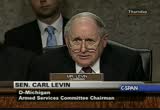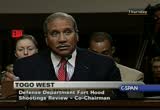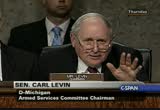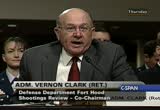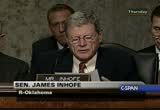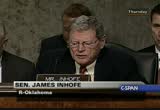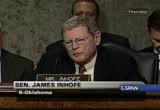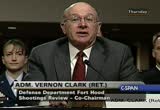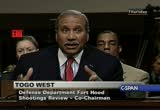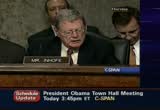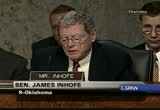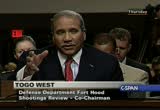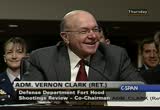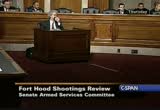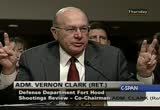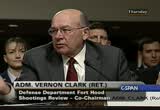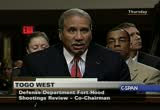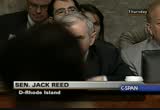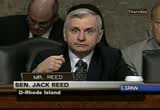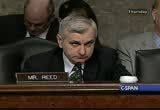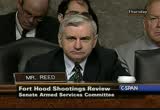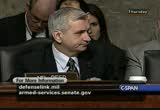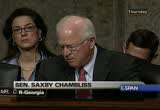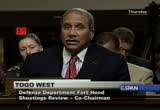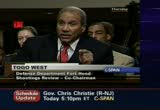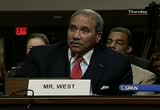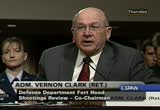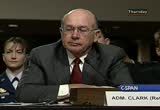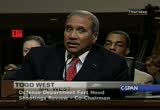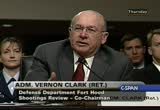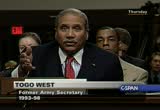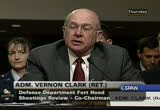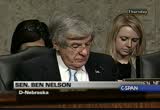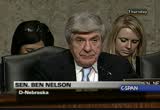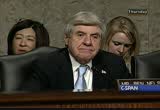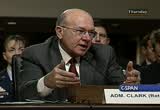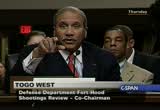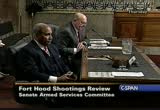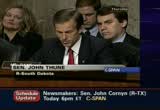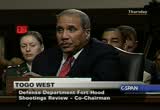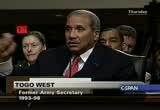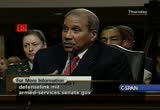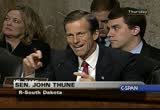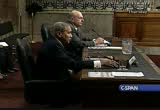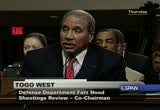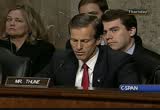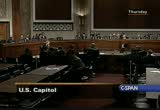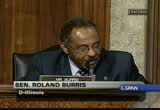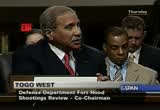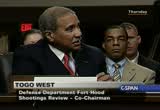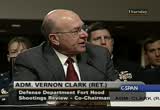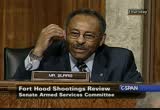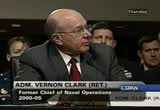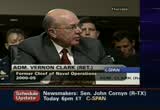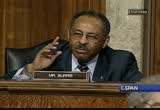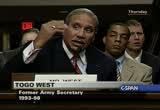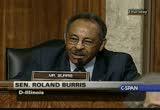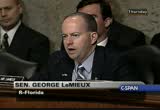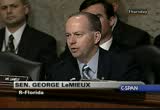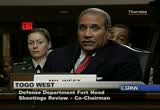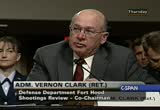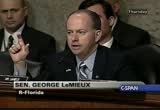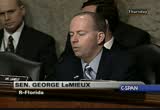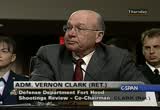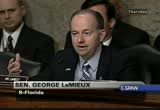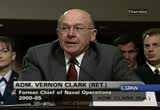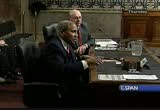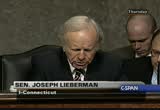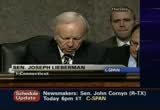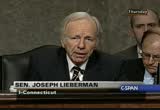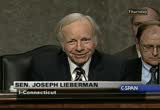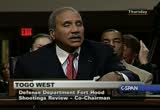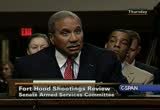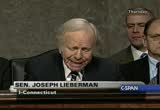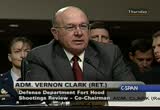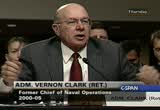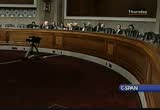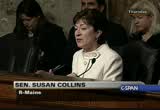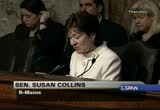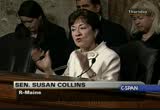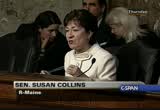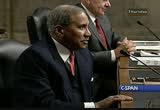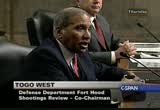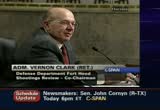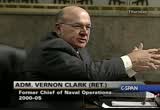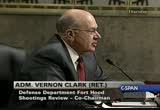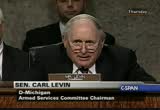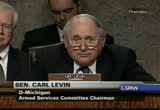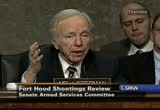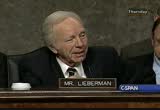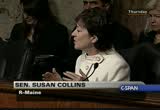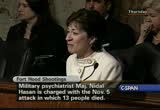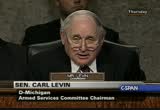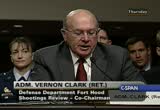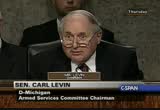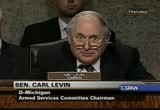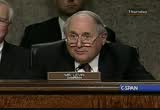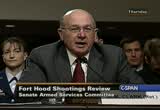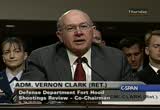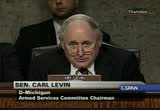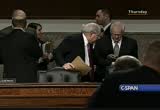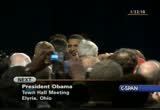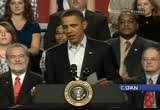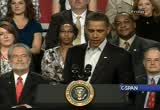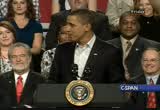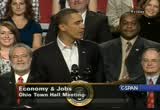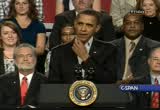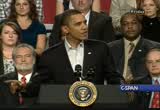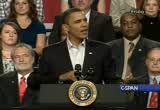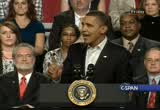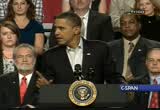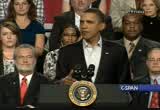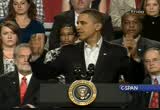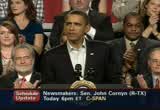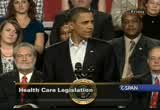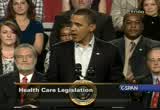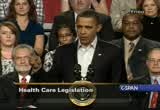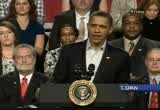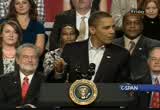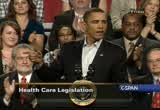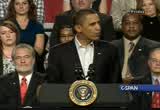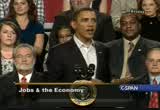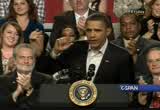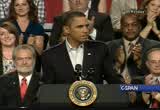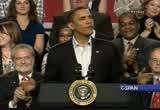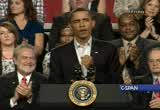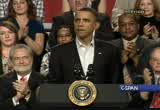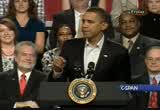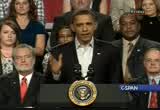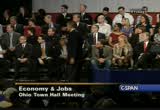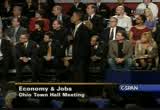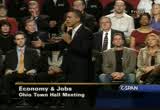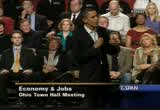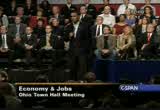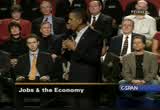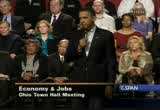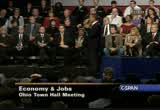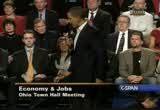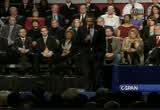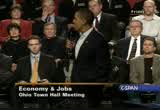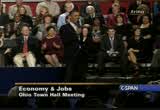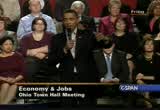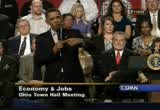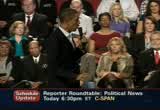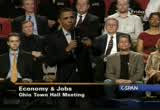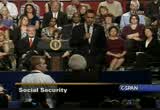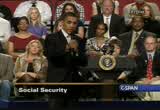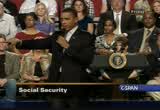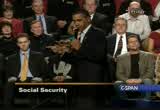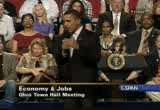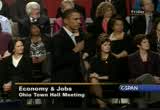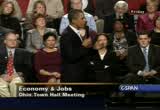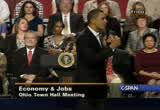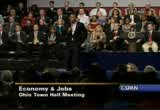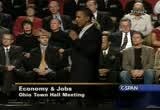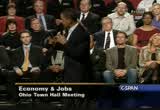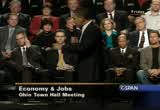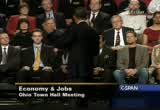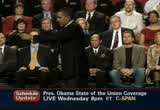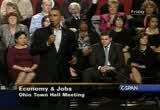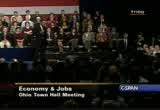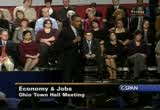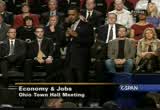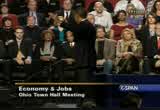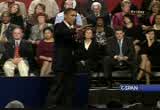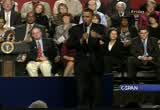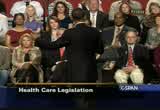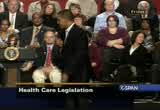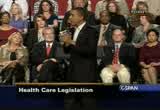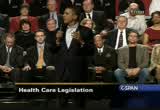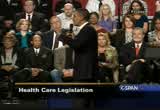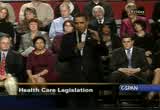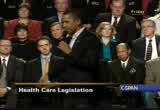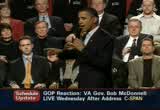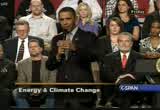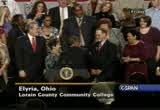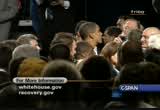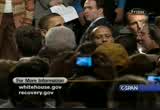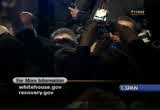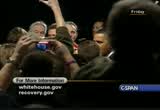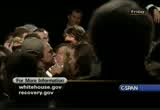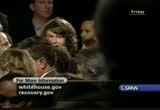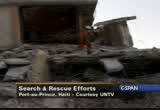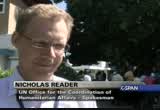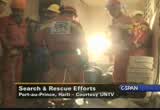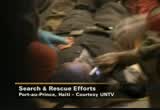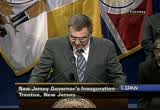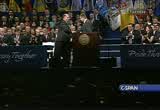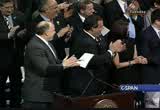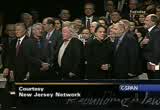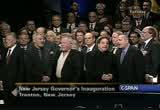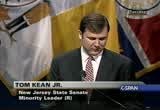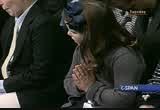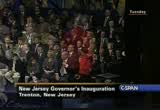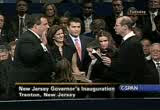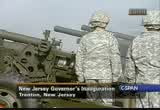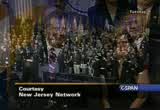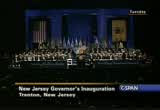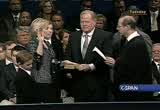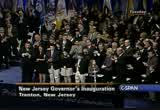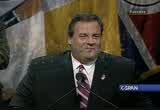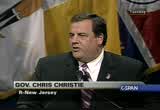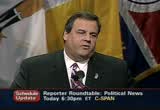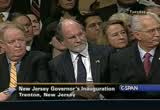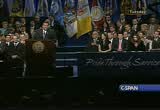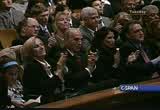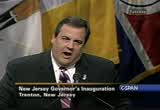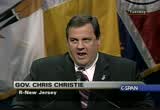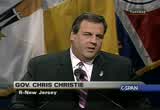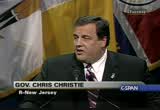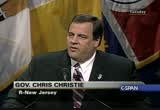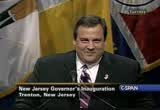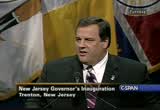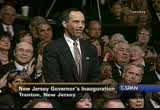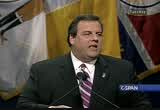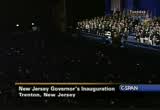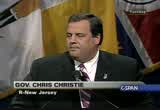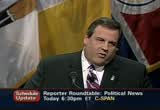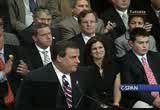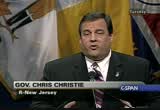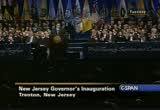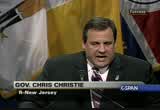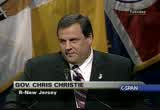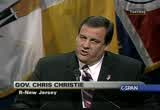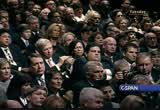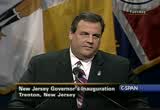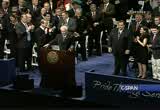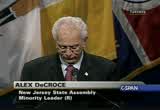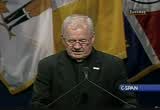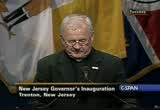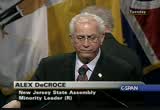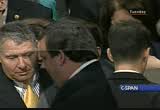tv C-SPAN Weekend CSPAN January 24, 2010 1:00pm-6:00pm EST
1:00 pm
whether or not we need to fully screen at the passenger manifest list against all of our databases, such as we described, at least 24 hours if not longer before the airplane is set to depart if foreign country to the u.s. >> i think some of that should be held for are classified briefing in terms of how the flow of information works. obviously, where we want to get to is if we have a derogatory information, that someone is a threat, they never get our of plane. the problem here is when they put all the dots together, that derogatory information was enough to advise the carrier not to put him on a plane -- it was not enough to advise the carrier not to put him on the plane. in regards to the entire movement of the system with millions of passengers that move every day, i would like to talk about that more in depth and a
1:01 pm
classified setting. >> you understand my point, that if prior to boarding the plane, what we have got is basically the passenger identifying information, and that is his name or her name, but not other informational like password or visa numbers. it may be that we will not be able to match them on the bases against the watch list. we will continue this conversation. thank you. senator collins? . . clarify an issue raised by the senator from missouri i told her as she was leaving i was going to do this. there is precedence for detaining someone on american soil as an enemy combatants in the military. as a pad deal was first arrested in 2002 and he was subsequently
1:02 pm
detained by the military for 3.5 years before he was charged in civilian courts. whether that was the right way to handle the case or not, it is in the a precedent. so it would not have been unprecedented to detainee the man on the detroit flight crew was not an american citizen. that could have been done and would not have been unprecedented. the second point of my friend raised had to do with the amount of information that was given. that was classified but it is evident to remain that you will get more information over a lengthier period of time. that is than over just a few
1:03 pm
days. it is not a coincidence. debt he stopped cooperating once he had his miranda rights read to him. and once he had advisers to get him to seize answering questions. i have a different view from my friend from missouri, but i wanted to establish this on this man being a precedent. this is to clarify the record. he talked about a significant number of individuals and able
1:04 pm
to travel to our country because they are on the no fly lists as i understand it very few of those 400,000 would have been valid, kermit, visas. is that correct? >> that is correct but approximately 2% are in u.s. positions. there are a significant number that can come into the united states without a visa. >> that is an excellent point and it is of great concern to us for some time particularly when we are looking at individuals in great britain who may have dual citizenship in pakistan and england and maybe using one passport to travel to pakistan
1:05 pm
and their british passport to travel to our country. i realize it is an issue for another day but if it's of great concern. we have to -- >> we have to learn the lessons of this case but not over learn the lessons. using this data is very much integrated in the equation. let me ask a question in when dhs was established in 2002, they wanted to assign personnel today's issue in diplomatic posts overseas to review --
1:06 pm
eight years later. dhs personnel as i understand it are in about 15 out of the 220 state department posts around the world. that small number is even more disturbing when you consider that dhs and the state the province have identified 57 posts as being high risk. i also understand that request to expand to three more of these high risk posts for more than a year and that you signed them
1:07 pm
recently. why the delay? you have a need in a high risk area with the dhs personnel. why let it languished for a year? >> we are not languishing. that's me talk about this. it was a being evaluated in light of all of the work being done about where our assets are. people need to have their highest use around the world. let me talk about the visa security program at both levels, there is a difficulty. they make the department's in a
1:08 pm
way where we run visas or we do not. either we do the relocations or we do not. we live in a half cast world right now. the base's security program is a screening/investigative program where in the embassies where we have it, they go out and do further research. as you have mentioned, it is limited and does not cover all of the embassy's nor can it, by itself be more than or should it be more than the winning -- many
1:09 pm
layers that should be constructed here. i would suggest to the committee that this is one of the things we need to look at. areas of the department where we kind of have authority and the kind of do not. we kind of have personnel, and we kind of do not. , but you did have the authority to deploy people to these high risk posts. -- >> but you did have the authority to deport people to these high risk post. if they did not languished for a year, are you saying that it took a year to evaluate the request? why the delay -- why the delay? >> it was an ongoing process within the department led by leadership in the department to look at this in conjunction with everything else we were doing internationally. >> was not the request made a year ago? >> i do not know when the actual
1:10 pm
date of the request was? >> it is my understanding that the request had been in your office for a year. i will follow up. >> i do not think that is accurate. we would be happy to correspond that to you and get the information. >> yankee. >> do you have any further questions? >> there is a vote, but if you would like to start, go ahead. >> thank you. this is becoming so obvious now with what it's been going on with this administration and with different agencies as well as different departments working together. there is a director of strategic planning to support effective
1:11 pm
planning. which is essential to preventing attacks. congress also directed the state department's coordinator for, but terrorism to collect all supervision for international counter-terrorism activities they appear to overlap. my question is of the state department cooperating for and how are you doing this? >> i think we are cooperating. i want to go back to something that the director said earlier. there are summoning people involved here and i do not think the legislation they created here -- i do not think it gave
1:12 pm
clear authority. it did not give us clear authority to direct action. we have become a mediator of sorts rather than a direction -- a director of action. it was directed to design a process -- whereby there would be primarily threat screenings -- priority threat screenings. we wanted to empower us to demand accountability at a more tactical level at a broader range than threats have been seen. it will acquire unilateral cooperation from the state department, who led security, the fbi, the military. it would it please give us the impetus to do that. >> thank you for that.
1:13 pm
the public has been very concerned about what has been happening. we tried to put different things in place. in it your testimony, you state that as an interim measure, you will deploy law-enforcement officers from across dhs to service federal air marshal's to increase security aboard some international flights. when will these officers be deployed and what training do they receive to ensure they are fully prepared? and to provide security inside of an aircraft? >> if i might reserve the details of the to plummet as a classified briefing. with respect to training, there
1:14 pm
is a specialized training. we have and a large group that started training this week that will be during work on february 1. it involves on how to take down a passenger on a plane and keep others say it while doing it, because you are in a closed environment. have to take down a passenger on a plane without causing damage to the structure of the plane. there are other things in different things from a law enforcement perspective that happen in that airplane setting that are different than a normal setting. >> this came to me when you were talking about working with other countries. ehud testify that tsa security
1:15 pm
requires -- it passes through@@ >> may impact our relationships with those countries as well as the countries charged with providing the additional security and could divert attention from other possible threats. my quick question is, have you heard concerns about this directive from other nations? and what is being done to address those concerns? >> senator, that list was developed from the state department's state sponsors of terrorist list, plus add-ons to it in conjunction with the state
1:16 pm
department. it is of concern to several of the countries that have been put on the list, recognizing that enhanced screening is happening for over half of the passengers from all other countries who are embarking for the united states. there's a very, very aggressive, very all-inclusive method. nonetheless, well, we are talking countries and talking about ways or things that they could do that would alleviate concerns and allow them to be removed from the 100% list and go under the list where we still do over half of the passengers. >> thanks for your responses. >> thanks and there is a vote on the floor. you have been really generous with your time. we will try to reschedule this
1:17 pm
in the spirit of cooperation as soon as possible. we may sit in with another commission a closer session. i know it is controversial and i have heard pressure back from a couple of countries. this is so critical which is the life and death of americans. you are talking about some more screening before you get onto a plane. it is done to achieve a public good. he started out with the right position. friends have complained about it, but it is the world we live in. >> in the.
1:18 pm
-- indeed. we want to make sure the environment is as safe as it can be. do not worry about that. >> i appreciate it. i thank you. we are in a war. we are in a world war with the islamist extremist that have attacked us since 9/11. they have been attacking us from various ways. you hold people accountable in close the gaps. you go on with the aim of securing the country that we are all here to defend and the freedom we are here to the fed. it is in that spirit that i appreciate your testimony. we applaud and laugh. we want to fix what did not work
1:19 pm
in these cases. we will continue to go on with these oversight hearings. we will go on a separate subject matter after that. we will keep the record of the hearing opened for 15 days for additional questions and statements. i thank you again. the hearing is adjourned. [captioning performed by national captioning institute] [captions copyright national cable satellite corp. 2010] oooo
1:20 pm
>> each year the washington center brings thousands of students to washington, d.c. to experience the workings of our government firsthand. the this weekend they'll discuss politics, government and their futures. q and a tonight at 8:00 on c span. >> the leaders of the pentagon inquiry into the fort hood shooting testified before the senate armed services committee hearing this week. they discussed the events leading up to the shooting and the immediate aftermath and how military basis could prevent future violence. this is about two and a half hours. >> good morning, everybody. the committee meets this morning to consider the findings of the
1:21 pm
independent panel appointed by the secretary of defense following the tragedy at fort hood. the primary objective of the panel was to quote, determine whether there are programs, policies, or procedural weaknesses witness the department of defense that hurts the safety of the employees and families, closed quote. today's hearing is on the unrestricted report. a restricted annex entitled oversight of the alleged perpetrator. it focuses on information which in the judge of the department of defense would prejudice a criminal prosecution. so our committee will have a closed session after this -- we'll have a closed session after this open hearing is concluded. our witness this is morning are
1:22 pm
togo west and vernon clark. we have reviewed their unrestricted report. members have had an opportunity to review the restricted annex. we welcome you both. we thank you for returning to government service for this very important task. it's a continuation of their great patriotism and loyalty. on the afternoon of november 5, 2009, the army field grade officer opened fire on fellow soldiers in the soldier readiness center at fort hood texas killing 12 soldiers, and wounding or injurying 34 others. there's information in the public domain indicating that this tragic and violent incident was preceded by a number of
1:23 pm
indicatorred that would seemingly raise questions about major hasan's ability to serve. some of those indicators with e-mail contract with a radical muslim cleric in yemen, concerned about his expressed belief that religious law took press sent over the constitution. and some of the witnesses implicated sympathy for violence and concerned by superiors and fears about his duty performance and his ratings. so there's a connect-the-dots issue here. there are a number of other investigations that will examine the failure to connect those dots. that is not part of today's open hearing. the department of defense's inquiry is one of several inquiry that is are or will be examining the incident. the president has directed a
1:24 pm
review of intelligence matters relating to this shooting. the fbi is connecting a review. and the military justice investigation is ongoing. the review that we will consider today was a first assessment of the department's policies and procedures. to identify gaps that warrant further investigation and action. clearly, there is no much that needs to be done. the secretary of defense is committed to tasking each service and pert than d.o.d. agencies to conduct an in-depth follow on review based on the findings of this report. the secretary of defense gave this independent panel less than 60 days to conduct a quick-look review, quote the, to identify and address possible gaps and or deficiencies in the department of defense's programs, processes, and procedures,
1:25 pm
related to identifying d.o.d. employees who could potentially pose credible threats to themselves or others. the deficiency of the department of defense protections program, the deficiencies of the department of defense's emergency response to mass casualties situation at d.o.d. facilities and the responsibility to careful victims and families in the aftermath of a mass casualty situation and finally the execution and adequacy of army programs, policies, and procedures as a applied to the alleged perpetrator. the panel completed it's work and delivered it's report to the secretary of defense on time. and that is remarkable. given the sort period of time over the holidays that the panel was given for this task. this could only be done under the strong leadership of our witnesses, who co-chaired the
1:26 pm
independent panel. a copy of the report of the department of defense independent review, entitled protecting the forest, lessons from forthood. he will be included in the record of this hearing. the independent panel made a total of 42 findings. with the associated recommendation in the basic report. where an additional 12 findings, excuse me in the restricted annex. the panel gives fort hood high marks for a quick and effective response to this incident. while recognizing the defense department can and should do more to prepare for multiple simultaneous incident in the future. the panel found that some programs, policies, processes, and procedures, were adequate but were not complied with. and other policies are in need of revision to give commanders the tool that is they need to
1:27 pm
counterinternal threats as well as new threat that is may manifest themselves in the future. the report produced by the independent panel gives the department of defense a blueprint for additional reviews and resulting policy changes. for instance, the department will need to evaluate and update policies and procedures for identification of indicators of violence, clarify policy regarding religious accommodation, review and improve military personnel records, and refocus the force protection programs on internal threats. this committee has a continuing interest in the findings, recommendation, and changes made based on these reviews. :
1:28 pm
1:29 pm
defense initiated this review to scrutinize itself with regards to organizational short comings that led to the horrific killings of 12 service members, one army civilian and the wondering of 43 others. however, most of your report is devoted to personnel policies and emergency shooting response procedures. the report concentrates on actions and effects rather than the motivations. response procedures. report concentrates on actions and effects rather than motivations. but it was motives that led to the ft. hood killings and that should have been examined. whether-- whatever the political correctness implications. the panel supper to assist the department defense and the american people to understand the threat to national security and to our military personnel was undermined as a result. we have a profound responsibility to try to prevent harm to all americans, especially those who volunteer
1:30 pm
for service in the armed forces and have as a result become high-value targets for our enemies. i find insufficient information in this report to advance their identification and elimination of this threat. the omission in your report of adequately recognizing and addressing the specific threats posed by violent extremism to our military service members is troubling. we owe it to our service members and their families to be very candid in addressing the threat of violence driven by violent islamic extremism. i believe general jack keene the former vice chief of staff of the army made the point clearly in his testimony on november 19th, when he said that we need to provide a service to all muslims serving in the armed forces by clearly describing the threats, explaining the indicators of potential problems and obliging all military >> i believe the information you
1:31 pm
compiled in the restricted annex to this report regarding failures in the performance of officer who is supervised major hassan during his medical education will help to ensure accountability and corrective measures. much of this information not surprisingly has been leaked to the media and it portrays a system badly in need of re-evaluation and reform. i expect the secretary of the army to move quickly to ensure accountability for the short comings you identified and to demand more from our officers and organizations. they should have the courage and integrity to identify substandard officers who represent potential threats to those around them. i hope you can comment today on what we should expect in this regard. i also believe that your findings and recommendations will add value in producting the department of defense in the services to take on the challenge of identifying the legal and regulatory barriers to information sharing called for
1:32 pm
in the report. there are an array of concerns that must be addressed in this regard, concerns about individual privacy, threat of litigation, equal opportunity violations, first amendment rights, medical privacy including stigma from seeking treatment, and abuse of authority are just a few. they represent a knot that has to be cut. what happened at fort hood was something more than an isolated incident, more than a random act of violence by an alleged perpetrator. it was a terrorist act struck against us as part of the broader war in which we are now engaged. without focusing on the threat posed today by violent islamic extremism to our military and their families, we can't address those vulnerabilities and correct them. i thank you, mr. chairman. our military and family, we can't address those vulnerabilities and correct them. thank you mr. chairman. >> thank you very much senator
1:33 pm
mccain and now we colin you, secretary west. >> thank you mr. chairman, senator mccain and distinguished members of the committee for the opportunity to testify before you on this important matter. i wonder if i might do one of two quick housekeeping things. you have i think in that ribboning opening statement the joint statement by both admiral clark and by me and we would ask you to include that in the record. and with that we will give a few comments that bit of the road map to what is in the report although we are aware that you have had a chance to look through it. i will do the first group and then if you will permit i will take it from there. >> that would be fine, thank you. >> as you pointed out senator in mr. chairman and you also senator mccain, that day, november 5th was the day of tragedy. we all will remember it as such.
1:34 pm
out of that tragedy there are some instructive lessons for us. and those are what we address in our report. as you pointed out, secretary gates was specific in what he asked us to do, contained both in a memorandum to west and his terms of reference and in his statement at his press conference. that is important to us because it bounds are undertaking as to the time we were, within which we were asked to complete their work and also as to the fact that he the had already indicated his intention to have a lengthier come tomorrow in depth follow-on review of both the report and the issues that we raise by the services. he has rtp gutknecht process of referring the report out for the follow-on activities. as you pointed out we were asked to look at personnel policies, specifically those that make
1:35 pm
identifications of those who are at risk of danger to their fellows in the service. to look at how those policies and practices and procedures allow us to deal with as a jury have identified those threats and to look at the ways in which there are gaps or deficiencies, his language, that we need to improve upon going for it. he also asked us to let get force protection measures. with the same idea of. not just in the army, but across the board in the department of defense and the osd procedures and regulations, at the level of every service. thirdly, to look at our preparations and the policies concerning preparations for mass casualty events for responding to them, for our emergency procedures if you will. and finally, in that group of
1:36 pm
four to look at how we provide for the support of those who provide needed medical care to those who serve. the fifth assignment that he gave us was a very specifically stated one and they think it is one of the annexes to our, one of the annexes to our report and that is this, to examine the army's application of its procedures and policies to the alleged perpetrator prego i make that distinction because he did not ask us to go and explain what happened, although it is certainly i think would appear to all of us, you and me as well that without an understanding of what happened we certainly could understand how the army applied the policy but on purpose and direction was to understand the are misapplication of its policies and procedures to the perpetrator. that is what is contained in our annex five. i should say to you as part of
1:37 pm
an understanding of how we organize and prepared for this that was the nephew going to be simply chapter 5 of the report. a report that we would submit to you today for recoup. after review, the department of lawyers concluded and i think they concluded properly that there was a great risk of interfering with the military justice, the criminal proceeding and that is why it was submitted to you as a restricted annex. with that in mind, we were told not to interfere with the intelligence investigation that it proceeded more with the military justice investigation nor with the ongoing parallel fdi ricci you and we have made an attempt not to do so. what we did do was to organize ourselves into five teams, supported by personnel with hunley assigned to the military department from osd and each of these teams looked into this specific areas that we have
1:38 pm
described in the report submitted to their activities to less than than a week, et mcclerkan diane those who work directly with us to take responsibility for reviewing and stating our conclusions and their views with respect to that. our personal views are found throughout the report but they are specifically called out in the executive summary which you note we took the step of signing ourselves so that you would know that the summary came from us including those five or six recommendations for specific early action by the secretary of defense. let me report he has already taken some of those actions as we have talked. we had also a board of advisers drawn from the senior ranks of the department, the military ranks whose purpose was not to lead the team of the two of them were team leaders but merely to review as we went and provide an overall perspective of what we were looking at and how we were
1:39 pm
stating its and hallet would affect real progress for the departments in terms of responding to what had happened. their help to us was invaluable, because when you think about it, otherwise the admiral had himself and me to bounce these things back and forth to, to discuss. the board of advisers gave us an additional group with the same broad range. a word or two at this point from both that mcclerkan me about the actual landscape of the report. what you have before you is five chapters with an executive summary at the front and with some annexes. the first chapter is a very brief, one-page synopsis that we thought we could stay in a public report that is much more dealt with in detail in the annex and that is about the alleged perpetrator.
1:40 pm
the chapters to come the three, four and five are about the bulk of what the secretary asked this to look at. aye your attention to chapter 2 which is about personnel policies which is divided into three sections, one having to do with how we identify the kinds of things that can lead a person to become a danger to his or her colleagues. a second part of it has to do with sharing that information, getting it to the right place, and i point out to you that in our finding, 2.2 in that report, we acknowledged a specific difficulty and that is of the fact that information that is obtained in one place does not always go forward with a service member to success of assignments. that is making it difficult for commanders to know exactly what they are dealing with. a third section in that chapter to has to do with the areas to
1:41 pm
action. three cummins, three observations before i ask your permission to have admiral clark take on the description to you of the other parts of the report. the first is this. there can never be too much preparation. in some ways we often could say that no matter how much preparation you have done there is more that could be done. at fort hood, the leaders had anticipated massive bense, m.a.s.h. casualty events in their emergency response plans and it showed in their response. you have knowledge mr. chairman and has also did senator mccain, the response was prompt. within two minutes and 40 seconds of the first 9/11 call, first responders were on the
1:42 pm
scene of the shooting and by first responders i mean elements of the fort hood security forces. within a minute and a half after that, the assailant had been taken dumb. and come within two minutes in 50 seconds after that, to ambulances and an incident command vehicle from oppose hospital of arrived to begin to dispensed needed medical care. lives were saved, and yet as you have pointed out, 13 people died and scores of others, 43 were wounded. we must prepare better, plan more intensively and take the hard effort to look around the corners of our future to try and anticipate the next potential incident. secondly, we must be attentive to today's hazards.
1:43 pm
today, the requirement that is imposed puts us in the defense department is to understand the forces that cause an individual to radicalize, to commit violent acts and thereby to make us vulnerable from within. and finally, the threat through all of this is violence. how do we detect the indicators of violence, how do we share the information about those indicators, and then whether we have the foresight to act. thank you mr. chairman and with their permission and admiral clark will take it from here. >> thank you so much, admiral. >> good morning mr. chairman. i appreciate the opportunity to be with you today to talk about the work of secretary west and myself and the group of people who work with us in this effort.
1:44 pm
let me make a few comments and get right to questions. i know that you will have questions for us so first let me just talk about force protection for a moment. the principle message of our review with regard to force protection is simply this. there are lots of policies on force protection in side the department of defense. since 9/11, we have built many barriers. however, existing >> the evolving threat that we see today -- and when people talk about the new threat we're talking about the insider threat. now, complicating the entire force protection challenge is the diverse nature of the wait department of defense has evolved since 9/11. and so one of our
1:45 pm
recommendations to the secretary was that you have to look at the organization itself. on page 25 of the base report you find a description of the various undersecretaries and assistant secretaries of defense that are charged with responsibilities for working the force protection challenge. sin chronnization is difficult. and simply stated, no senior d.o.d. official is assigned overall responsibility for synchronizing this policy. i'm not saying that one person should have all that responsibility. neither is secretary west. we were careful not to define the specific organization for the secretary of defense. our observation is synchronization is pretty difficult the way it is today and it need to be looked at. there has to be a mechanism in place to do this integration and
1:46 pm
that's our recommendation. >> secondly, the task of i.d.ing employees who potentially could threaten the work force -- and i ask us to remember that the secretary asked us to look at violence. and so the question is, how do we identify individuals who have the potential for violent behavior. and certainly in our research we found that detecting a trusted insider's intention to commit a violent act requires observation skills that may not be in place. to commit a violent act requires observation skills that may not be in place. this is the evolving threat, and so there is a requirement to understand behavioral cues and anomalies that would alert commanders in supervisors to know that such a threat exists. and while the department focuses
1:47 pm
very effectively on many things, there is insufficient knowledge and guidance concerning who this insider threat is. who are these people? there is insufficient guidance on workplace violence, and most importantly how to identify the person who has the potential to self radicalize. in our view it is simply insufficient. the key word here is violence. now, since the report does come out some have criticized us for not suggesting and talking enough about violent islamic extremism. but, when we talk about self-radicalization and the term appears numerous times in our report, we are talking about the behavior's that create and lead to violence. that is what we are talking about. the lack of clarity for comprehensive vindicator slimness the commanders and
1:48 pm
supervisors ability to recognize potential threats. fixing this issue will be critical to solving this problem in the future. dod policy on prohibited activities, and i have the instruction here with me that talk specifically about what prohibitive activities are inside the department, this instruction in our deal is too limited and it only addresses active and very visible participation in groups that may pose threats to good order and discipline inside the ranks. so, we found that this lack of clarity for comprehensive indicators which limit commanders in supervise its ability to recognize the potential threats and so we are talking about whether, we are talking about people who could hurt themselves. the secretary of defense cited
1:49 pm
specifically people's been hurt themselves. for example the issue of suicide. criminal in gang behavior, people advocating supremist doctrine, family violence evolving threats like self-radicalization, identifying these key indicators is criminal to focusing the force on the threat. let's talk about information sharing. secretary west addressed it also and let me just make a couple of points. the policies governing information exchange inside the department and in the interagency, intergovernmental system itself also, in our view the policies for-- word addition. they do not support detection and mitigation of the internal threat. dod gann service guidance does not provide for maintaining and transferring her old and
1:50 pm
information from one duty station to the other. now, remember we are doing phase one of this as you talked about mr. chairman. we did this with you in a hurry. that is what the secretary of defense wanted us to do. thousands of pages of urdu that put the spotlight on the things the services can go fix in a hurry and it is our view that this internal information exchange has got to be examined. in other words, how can a commander connect the dots that they don't have the, some information maintained at the local level and has since transferred from one commands to another and i will tell you that automated systems inside the services did not allow them to share information on for example registered users in persons who routinely come and go from a base and may become a threat, said the issue of maintaining in transferring all of the relevant information, information that could lead to the ads in the vacation of contributing
1:51 pm
factors, that is the issue. last friday the secretary of defense and his press conference stood and address his observations about our report and one of the things that i was happy to see him address was his comment that secretary west and i are of the view that we have to become more adaptable and certainly we have to be proactive, but we have to be able to adapt rapidly to this changing security environment, bringing a wide and continuously evolving range of tools and techniques and programs into place. i just want to emphasize that there is no single point solution for this evolving threat. we have to keep working at it. we need architectures and structures in place that will make that possible. no, what the other point about information sharing. certainly, robust information sharing is an essential. and in glove with that
1:52 pm
information sharing is the required command and control apparatus, be it systems, policy, doctrine, a tactic techniques and procedures to convert this information in a timely decisions and actions. the bottom line mr. chairman, members of the committee, we have got to remove the barriers. all of the barriers. we have to equip and enable the commanders and the people in decision-making positions to take their ability. mr. chairman you use the phrase, to connect the dots. we have got to get the information and thus the indicators to the appropriate level of people and command. just a couple of comments about the emergency response. secretary west address this mr. chairman. dew also certainly did justice
1:53 pm
to the brilliance of the people's fort hood in their actions. lots of good news related to the emergency response. mr. chairman and members i just want to try to put this in perspective, and so you know i committed my life in service for 37 years. i created in those 37 years a number of lessons learned myself that i heard dozens of lessons learned. on the second day that our team was in existence, secretary west and i got on a plane with 50 members of our team and we went to fort hood. and, we walked the ground that they showed as the space for all this happened and we looked at the terrain. and then we sat down with general colin and his command team and they gave us this presentation that had been turned in a matter of a few days and their lessons learned and i want to tell you that i was real impressed, so i heard a lot of them in my 37 years and i want
1:54 pm
you to know that i'd never ever heard a better one than i heard it fort hood that day. the base personnel were ready to respond. they have trained at this, they had worked at it. secretary west talk about the timeline response, the response to the active shooter. it was brilliant. and all of that said, it still could have been better and in our ricky we found areas where it could be better and in their own lessons learned they identified the areas where it could be better. i have spoken on the last subject about the command-and-control system. they need a better system. general cohon had to deal with misinformation and should anybody be surprised? i don't think so. there's never been a crisis ever that there wasn't misinformation. being able to do with it in a rapid way in being able to deal with a potential multiply dent mr. chairman as you indicated,
1:55 pm
is critical. and so, fundamentally we believe that we can improve by providing aid well integrated means to gather and evaluate the and disseminate the wide range of information that will make it possible for commanders to perform to the maximum. and so, this report is about focusing on better tools for commanders. this report is about focusing on violence prevention and whatever form that violence manifest itself. this report is about adapting, adapting an evolving through rapid change, sharing information, connecting the dots and exercising against the most stressing and pressing some areas that we know how to present so that we satisfy ourselves that we are able to perform to the standards we have identified for ourselves. and then i want to close by just acknowledging my alignment with
1:56 pm
all the comments that then made about the people at fort hood, the families that have suffered loss and just say that the thrust of our work has been to do everything we know how to do, to identify policies and procedures and practices and programs that can be made better, said that the united states armed forces continued to beat the outstanding force that it is today. thank you very much mr. chairman and i look forward to your questions. >> thank you admiral. thank you both very much. let's try the first round. the panel found that the quote department of defense policy regarding religious accommodation lacks a clear the necessary to help commanders distinguished appropriator religious practices from those that might indicate a potential
1:57 pm
for violence or self-radicalization, closed quote. i think what you are saying is that obviously this country believe sin religious tolerance, tolerance of the other religions, but it can never be tolerance of violence, radical views that are dressed up in religious garb. i think that is, that point reworded, i couldn't agree with you more. sometimes the views that are clearly either inherently violent promote violence are dressed up in religious clothing, and that automatically means that people who are sensitive to others' religious views then are kind of put on the defense of right away or reluctant right away to point out what is underneath the claim
1:58 pm
of religion. in so, the line has got to be there obviously. we want to continue our tolerance, but we have got to be much more and tolerant of these that are radical that promote violence, or encourage violence. and so, my first question i guess to you is that the policy of the department, which is limited to and addresses only active participation in groups that pose threats to good order and discipline is far too narrow a policy, because of the self-radicalization point. you don't have to participate in a group that opposes that kind of a threat to be a threat to yourself. and so, i guess my first question is, how would you-- i
1:59 pm
know if you are not here to provide remedies. that was not your job but i assume that you agree that it was just not that that policy should be examined but in your judgment at least it is just simply too limited a policy. and i am wondering whether not for instance you would agree that communication with a radical clerics who promotes violence is the kind of contact that should raise real questions. would you agree with that even though it is not active participation at that point? it is >> would you agree that ought to be raising great suspicion without getting into this particular case? >> police officer chairman, i would certainly agree. i think we both would. i think your larger point that this is an example of we and that is that yes, in the past
2:00 pm
perhaps membership alone that group may have been less looked upon than the actual act of doing things. but in this environment we have to look at the group. we have to understand its purposes. and it is already considered by some that there is a tool that enables the commander to declare certain kinds of actions including that a threat to his immediate area's good order and discipline. but we think the department of defense can simply strengthen the ability of commanders to look at and examine exactly what kind of activity they are permitting and whether or not we can better define it. group membership in a group of that sort that has a record of active advocation of violence, and as well as your point, communication especially repeated communication -- again not referring to any particular case -- with those who advocate
2:01 pm
violence. those are all signals that we need to be able to indicate in our publications and in our regulations commanders are authorized to look at and react to. >> and even if there weren't active communication -- excuse me, active participation or communication with radical persons who are promoting violence, even if there's simply the expression of views which promote violence without any information about participation in a group or communication with radical extremists. if somebody gets up and says, "i believe that the constitution comes in second and that my religious views come in first" would that not be that kind of a signal which ought to indicate some real genuine concern? would you agree with that?
2:02 pm
indicate some real genuine concern? would you agree with that? >> i certainly do agree with that, and it goes without saying that where we draw our red lines this week very important point, but you know if you look at our history, we as people, as americans have always been very careful working about where we draw those lines. i so appreciate your introduction to this question and your comments about, that we are a tolerant people. when i look of the dod instruction here talks about what people can do when they are at work, and things that they can't do at work but they can do in their private time. and what we are suggesting is that we have to better understand how people go through this process. from being a non-radicalized
2:03 pm
person to radicalization and what does it mean, and so, i aligned with your comments completely. i want to make one other observation mr. chairman. in our report, we talk about active-duty members of the military, but you know the department of defense is much broader than just reacted to the people in uniform and we also understand that when americans raise their right hand to take a pledge to serve in the armed forces that there are some freedoms that they set on the shelf. the challenge that we are facing here in security applies to everybody in the department and that includes civilians as well and contractors and the whole nother body of people and then you could look of this and say, you know this is not just the department of defense. this is the whole of our nation and the whole of government. this is a real challenge that we
2:04 pm
face. and it is clear, so you made the comment on the shipmate, here was the comment that was being made approaching a defined red-lined are crossing a defined red line. we must make sure our people understand where those red lines are in that means we must have a very effective education program, and our reach program that people understand. this is about our own security and their right to self-defense is absolutely not a question we have the right to do that. >> people should not be afraid of reporting information that they believe in good judgment represents the potential threat to good order of discipline and to the safety of the country or of their own group out of fear that there might be, that might be viewed by some as being intolerant of religious views.
2:05 pm
we have got to simply allow people the freedom to report something which they believe is a threat to their group, their country or to the individual himself and not be dissuaded by the fact that the views are dressed in some religious garb. >> good order and discipline is the fabric upon which the greatness of the united states military is built and we have to ensure that we do everything we know how to do to protect it. >> secretary west, did you want to add anything to that? >> no, i think the admiral, the .-made which is we essentially, to the effect that we are talking about expressions and expressions in many cases pertain to religion, to different hits on the first amendment but as you pointed out, when a member takes an oath of office, there are some things that to which he or she agrees to be regulated and we believe that where there is a clear connection with a potential for
2:06 pm
violence, that would cause damage to once fellows in service, this is the basis on which we can encourage the department to act more clearly. >> and my final question is this. you have not been given the charge of giving, recommending remedies for where there are gaps. that is not part of your charge although you freely responded to my questions this morning and i appreciate that. who is in charge of responding with remedies to your recommendations? what is the timetable? does this go right up to the secretary of defense and his he assure you that he will consider appropriate remedies within a certain timetable or is there somebody else in the department that is on the remedies side of what you have outlined here? >> the answer tear question is twofold. will take the second first which is yes on this follow-on review he is ordering two sets of
2:07 pm
things. he is in the process. one he is going to ask a senior member of his staff, we believe but we don't want to commit him. it is his priority, not ours. perhaps the assistant secretary for homeland defense or security, not authorized to make that statement, don't know but i believe to conduct a follow-on refute but each of the services also, and part of their job is to take this report, referred to them and provide their recommendations as how to implement. that is the first-- second answer. the first answer is in some ways to give admiral clark and me to much of the by. the fact was to come up with actionable recommendations as well. >> alright, that case i withdraw that comment. your recommendations then, to be acted upon in a certain period of time?
2:08 pm
>> i am not clear. >> whatever is referring to is this. you say there's an adequate clarity on the issue we have been discussing. the recommendation is a general one, provide clarity but it is not specific clarity. you should provide clarity mr. secretary and i couldn't agree with you more but it is not what the new regulations should be. that is fine to be left up to the secretary. that is what i meant when i said he was not provided a specific new language that should be in place, replacing the hon clear language. that is what i meant by that. nellis there a timetable? >> there is a timetable. he pronounced it friday. >> what is it? >> he wants first impressions back in march and he wants to wrap this up by june. if you read the language, weaver very careful with their recommendations. first of all, you confirmed the secretary of defense and that
2:09 pm
allows him to be the person who makes policy and we were very aware of the fact that at one point in our lives we were those people, but we are not those people today. serwer we suggested on numerous occasions he review policy, because we thought there were holes or weaknesses or gaps, there were some places that the language is slightly stronger. it is absolutely clear to us that policy and we say sometimes it is an adequate, but we tee'd it up and away so that they cannot put the spotlight on it and he is given them a timetable. >> thank you. senator inhofe. >> thank you mr. chairman and i want to pick up on two things he mentioned in the first one i will be criticized for. it is not clinically correct, but i will make this statement. when you are round washington and in these hearings is one thing but when you go back to oklahoma as they do every week,
2:10 pm
that is another thing and i am always hit up with this idea because we are talking about the fort hood they now but i can talk to you about abdulmutallab, the christmas bomber, the extremist views were evident from the university college london and goes on and on. 19 november the father reports and we all know about that report. lathe november he was added to the u.s. 550 name terrorist identified as the day the market all of this stuff. all this stuff that we knew but that is not your pretty, i understand that but nonetheless it is the same. a terrorist is a terrorist and that is what they do for a living. they kill people and i for one, notice not politically correct to say i believe in ethnic and racial profiling. if you are looking at people getting on an airplane and you have x amount of resources come
2:11 pm
again need to get at the targets. i just think it is something that should be looked into. the statement that has been made is probably 90% truth, with some exceptions to the federal office building in my state of oklahoma. they were not middle easterners but when you hear that not all middle easterners or muslims between ages of 20 and 35 r terrorist alterius are muslims or middle easterners between the ages of 20 and 35 that is by and large true and i think that sometime we are going to have to really come at least i'm going to have to have a better answer when people aboard planes and get into environments such as the environment we are dealing with with this report. i guess nothing more needs to be said from you guys on this. let me first of all say, which i said it said that first there are no to other people better qualified to do the job than the
2:12 pm
two of you and have been good friends of mine for a long period of time. now, so that we can talk about it i think a little more easier, your purview is really a domestic. most of what you were talking about was making the recommendations coming from what happened with the incident at fort hood. did you look into outside the united states, where thousands and thousands of troops all over the world and to me, the threat is probably a little bit greater there than it would be here. what futzed you have on that or maybe recommendations he would have on that to expand what you are doing to include that? >> we certainly did. senator, the first thing that comes to my mind is every base where we exist overseas, we have not americans working with us on
2:13 pm
the base. what are the processes and procedures for setting these people? so, we challenge it and we have a section in the report that talks about security clearances and how people gain access. so when we are trying to come of the second thing i talked about, identifying people who could become a threat, one of the things we have to look at is how we have that people in the conas environment. i would suggest to you and frankly this would probably be better, the details we might talk about in closed session but i would suggest to you that it was our conviction and we would not have put it in the report if we didn't think that this was certainly a potential weakness. >> yeah. >> maya at senator dis? if we take the lesson of fort hood and admittedly we will talk more specifically when you have your closed session, we have to
2:14 pm
be reminded that the thesis on which we are dealing here is essentially for this whole report is the threat within. the member of the military family who then turned against his or her fellow soldier, airmen, sailors, marine, coast guard person, and the difficulty there, whether it is conas comeau with the universal access card, their id, they can enter what should be the safest place either here or there, the base, the post, freely with their automated systems now. we don't stop them for routine checks. and so, we can't, we can-- certainly one of the lessons learned at fort hood was some roving checks, even those who have the credentials, but the place to stop them, the insider
2:15 pm
who is a threat is not at the gate. it is to identify him or her before they can get onto the poston to that act. and that is why all those signs that we talk about, all the queues and behavioral indications, even the ones that the >> and that applies to both here and overseas. >> you know, one of the things that came out that was discussed here by the chairman was can we move this along faster? i think you want to do that, we want to do that. we still have some of the recommendations of the 9/11 commission that are not fully implemented and understood. so i would assume that you share those feelings. i was about three weeks -- down at fort hood about three weeks before this incident. that's when we had two of our
2:16 pm
oklahoma unit were deploying overseas and i was down there for that event. and i went down afterwards for the event that took place after the tragedy. you had said and i'd asked my staff to hand it to me so i could read it again, this pretty remarkable, mr. secretary, you said two minutes and 40 seconds after the initial 911 call first responders arrived on scene. minutes later the assailant was incapacitated. two incident command vehicles were there two minutes and 50 seconds later. that's really moving. i would recommend -- and maybe you've already done this -- but that you find out not always look at what is wrong but learn from what was right. and in this case i think it would probably serve us well to see how they did that remarkable job. i wanted to see it in writing after you'd said it because i think that's remarkable. so i recommend that you do that. >> thank you, sir.
2:17 pm
it was remarkable. and we did think that one of our jobs was to find out if that was the result of good planning, courageous and fast action, was there an element of luck, and if it was what we've believed and what we said, excellent planning and well executed. is there a lesson to pass across the force. we have said, excellent planning and well executed, is there a lesson to pass across the force? one other thing i would add. i don't want to overdo but, let me add it any way. we tried as best we could to figure out what that meant from the passage of time from the first shot by the assailant to his last. that is, the holy center, because the uncertainty part was how quickly they 91 one-call got in after the first shot was fired. the best we can make is that the whole shooting incident was
2:18 pm
ending by our security forces between seven and eight minutes after it started. >> were you surprised that too? >> i certainly was, so one of our strategies frankly senator-- this kind of a panel is supposed to find things that are wrong. that is what we are supposed to do but if you notice we leave with some strong statements about what we thought was right because we wanted it up front that the people at fort hood did a fabulous job. you know i testified yesterday in the staff reminded me that i said that the lists are excellent or outstanding 19 times yesterday, but i want to drive the point home. i said this was the best lessons learned i had ever seen and the performance of the people were brilliant. were there things that could have been better? yes. one of the reasons was it was brilliant because of the brilliance of our people. they are so good. and of course, nobody had a stop what's going on inside the room where he was shooting so that is
2:19 pm
why we don't know the exact time as the secretary indicated between the first shot and the 91 one-call here is what we do know. there were a lot more browns available. and they took that shooter down, and the sea ideate ginned was handcuffed to him in a matter of moments and was with him from that point on. >> let me commend all of them for the fine work they did. >> it was incredible. >> thank you. i would just take two seconds just to say i disagree with your comments about middle easterners and muslims and the implications of those comments. i would want to say that, except what you are here. >> i understand that. i expected that. >> senator reid. >> thank you mr. chairman. admiral clark, you mentioned in terms of the threats of generic
2:20 pm
self-radicalization that would lead to violence and there are several different issues, as you suggest categories. that is not simply islamic radicals but a host of others. is there a strategy and the department defense to identify these potential categories into an essentially work explicitly against them or to at least be aware of them? >> first point, the people in the public domain say we did not use the magic term, radical islamists, and so we didn't do it on purpose. it wasn't because we were trying to be politically correct. it was because our task was to deal with violence and this was one of them but i don't know how people could read their comments about self-radicalization and not understand that this kind of
2:21 pm
radical islamic behavior is part of that group. we said specifically those of the indicators are inadequate. now, having said that, on friday, the army published the list of ten coming in this is something out there that is better than nothing. and in the close session i would like to get into this in some detail but to say we believe that all of the indicators related to violence are not static indicators, and so one of our proposals is, we are living in such a rapidly changing world, potentially we should be considering the establishment of the group that focuses on this full time, across this-- i have this whole series of kinds of behaviors that we are talking about, criminal, drug, domestic abuse, gang activity come supremist ideology, sex crimes,
2:22 pm
sabotaged, arson, domestic violence. peart talking about all of these. and so, i chose that is the response to your question. >> mr. secretary to melbany comments? >> there is an annex to our report that discusses the sources of violence in some detail. it is an example of the pieces that our research is consulted and i think it is very informative. i agree with the admiral's response. while sojourner executive summary of the five or six key things that we recommended to the secretary that we pull out from this report is the suggestion of a body that will collect the indicators of violence, update them in light of current circumstances, of the then cqynar world, and then make them available on an updated basis to the commander sent
2:23 pm
supervisors who need to use them to make their judgments. >> let me again turn to admiral. did you believe or conclude that there was adequate information coming from walter reed to fort hood with respect to the major-- i mean was there a problem there in terms of you know, letters of reprimand that might have been issued in a formal reprimand that we never fully communicated to the commanders at fort hood, really weren't able to gauge the seriousness of this individual? >> senator, i wonder if you would let us discuss that in a restricted session? >> i appreciate that. there is another issue and this might come of this i thank can be, i will let you decide, discussed in public. there were many indicators about
2:24 pm
mr. hasan's professional skills, is far removed from his religious beliefs and his discussions. just his simple confidence, his ability to work with others, those things that are fundamental for being an officer in the military. and yet he was sort of moved along and i know this question has come up and in these critical areas, where there are not a surplus of individuals such as mental health professionals, psychiatrists, etc., is there a double standard in terms of had he been a line officer or an infantry officer or artillery office. his radicalization but a simple performance with that have been-- gotten him kicked out? >> we are prepared to discuss that with the but we would ask you to do that in a restricted
2:25 pm
session. >> i appreciate that. >> certainly the part of what we have to say is an annex. we used the word officership in the open report. officership was intended to mean more than just leadership and it was our view that there were officers ship deficiencies, and in the closed session we can talk in great detail about the specifics of that. >> just one final question. >> senator i would just add also come in our one page summary discussion in chapter 1 that is in the open report, we did mention the findings and recommendations which had to do with the army application of its policies to the perpetrator. but also in the fact that there were signs that were missed and some that as far as we could tell were ignored.
2:26 pm
that is in the open part of the state and. >> thank you mr. secretary. again, part of this response is going to be training, not just commanders but individual soldiers, sailors, airmen and marines. we have something that when it comes to traditional subversion and espionage and the old world war ii loose lips sink ships and that emphasis is persistent. do you envision something like that in terms of sort of the training elements going forward? >> i mentioned just briefly but probably did not emphasize it well enough. there clearly has to be in our reach program here. >> at reach program, i'm not talking about an hour rege program outside the department. i am talking about inside the department and notice, the secretary of defense said on friday and we suggested that
2:27 pm
communication, effective communication is the order of the day here in secretary started that process on friday. when he said to commanders, this isn't just a ho-hum daily, and i am paraphrasing now, ho-hum regular day-to-day stuff. commanders have to look past the day to day. there is no doubt that a very effective training in outreach program is part of an effective solution. >> thank you very much. thank you. >> thank you senator reach. senator chambliss. >> thank you chairman and gentlemen you previously have served their country well in your respective capacities and we appreciate you coming back once again to help the steel with an issue that obviously is extremely important. at the same time extremely sensitive, so thank you for your continuing service.
2:28 pm
2:29 pm
because it is expensive experience with oer satellite. so let me tell you what we are responding to here. the fact that there is a very good argument that there are tools out there commanders can use to make the assessments they need to make. the question for us though is are there ways to strengthen what they can do? and have we learned anything about the incident we faced and will discuss with you in a closed session from this instance about how we can sort not up? and one thing is, that frankly, things like officer efficiency boys in the services is all of them. mr. clarke and speak more than i can. but doesn't always find and report the kinds of things that would be better to report. for one reason, it may be the cause of the information of some offensive previous uses that have been a real ballot tatian
2:30 pm
efforts or of some other type of sign me >> it never gets to the next commander, the next supervisor. and suddenly earlier signs are lost in the midst of the path and as they move forward. we need to shore that up. we said to the sent in our executive summary, in our five or six big recommendations, you need to say to the officer corps of the nation in all the services that what you report on these o.e.r.'s and on things like the f.a.e.r., service school academic evaluation report which takes the place of the o.e.r. when they're in service school, you need to say that mat terse and it has to be accurate and most of all complete so that we can make the judgment we need to make. that's the thrust of what we're doing here. so yes, reports exist. but they're not being made use of in a way that fits what we
2:31 pm
need in these new and trying times. >> so do you think it's a matter of further education of those supervisors that are making the -- or asking the questions and making that report? >> i have an answer to that. but i want to get admiral clark involved. my answer is education yes, but also making sure that the standards we ask -- and maybe that is education -- are applied. but they're also the recommendation for some further adjustments. >> admiral clark? implying. >> admiral clark? >> i don't know the firstborn that you reference. i have the second forms here in front of me so i can talk specifically. >> afford a 56 is the army and development so counseling form which i understand is completed one figure as a quarterly report
2:32 pm
for the enlisted and officer personnel. >> i don't have that in front of me that i would say that for minotaurs e-echo affect the width it would be great if the person knows what the indicators are. and our reviews suggest that in the area of self radicalization that can be very fuzzy. and so -- and the reason we suggested the fbi as they vardy started doing some work here, so we're saying to the secretary, don't start from scratch, but also the recommendation to use every expert that we know how to get because we're looking for behavioral fuse. and these are subtleties. and once those unknown, i have every confidence that our leadership, our supervisors will now have to deal with that. my interpretation of that was we were talking about an education and that's why we've got to have
2:33 pm
an outreach program that gives the right training to the right people so they understanding of these issues. >> if i'm hearing you right, with regard to which both of you setting your statement in your answers to your questions by far, we did a great job responding at turn six, our men and women were courageous and heroic intimated job. but with the events leading up to the incident, we got some major deficiencies. in fact, admiral, you alluded to this i think you call it an evolving threat for your exact words that you said earlier. are there any protection or preventative measures that are in place to detect for example an individual who is one of those folks that i would categorize as an evolving threats, who might simply join in a branch of military with the intention of duplicating what happened at fort hood? what if we got in place now or
2:34 pm
what do we need to do to ensure that we don't have somebody who spent the last six months and yemen were four years ago spent six months in yemen with the idea of ultimately coming back and having been framed to go when and if the cape event? >> or even who spent a bunch of years or months out in the wilds of her country becoming radicalized in a different way under different impressions. the question is the same. you're right, senator, there was no feeling by those at fort hood and a response. if there were gaps, and within us as we try to prepare ourselves to identify those factors that would say this person is going to be a problem. we need to act. but i think your question was for the admiral. >> i agree completely with what secretary west has said. and now we're talking with the thrust of your question gets us to this issue of the
2:35 pm
identification question that i raised this point too. and that identification question basis things about the manner in which we do checks and what's involved there. and i think it would be smart not to inform an enemy in a public way about my particular impression if it's all right with you that we talk about that in closed session. but affirming your comments, this is part of the challenge. and by the way, should we not expect that they are going use every technique and scheme of maneuver that they could figure out. >> absolutely, that's why we have to number one get the information, but further to your point you stated earlier admiral as we've got to share that information. it's got to get into the hands of the people who are filling out those forms or are making recommendations relative to an individual.
2:36 pm
>> thank you, mr. chairman. >> can i say one more time, get rid of the barriers inside and outside of the department. the barriers to information flow. >> esther chairman, i'm sorry to keep us going back and i had one more thought to that? here's another problem that your questions in admiral clark's response and that is let's take religion. the reason we have members in record on the representation of people of various relations and our forces is because they self identify. they say, this is my religion or i'm an episcopalian or what have you. what about those who formulate a reason to hide their purposes? i don't disclose their religion. don't disclose anything that would cause less to try to --
2:37 pm
this is not your term, to try to profile. it's the indicators, the behavioral cues that we have to rely on. they are our only way of getting at this in any organized and aggressive and effective way. >> and one more comment and so that you know, the alleged perpetrator was initially in the army as an enlisted person and he went off and went to school. when he came in the army the first time, he professed to be a member of the islamic faith. and when he came in as an officer, he did not declare. so all of the indicators are right in front of our nose, but i've got all the statistics here to talk about every brand of religion that we know about. the reality is that the way over half of our people never, ever declare what they choose not to declare. so it's not always immediately apparent and that's why this is a challenge.
2:38 pm
but really focusing on the behaviors and that's what we wanted to put the spotlight on. the department in its guidance and instruction to the commanders and all the people in the field are going to go by this document. and this document doesn't have to associate guidance about self radicalization. >> thank you, senator nelson. >> thank you, mr. chairman and thank you for your dedication and time and putting together very well organized and i think insightful reports. i appreciate it very much. so far we haven't really talked about, let's say, patient or the evaluation process. and of course, connecting the dots requires that kind of an evaluation capability for it to be able to tell us anything in determining behavior if you don't have all the background, perhaps you can't establish
2:39 pm
that. violence in the workplace is not unique now to the military. it's part of everyday life, unfortunately. and that kind of violence isn't necessarily a result of self radicalization in the workforce. so i'm wondering, and connecting the dots as he looks forward not only self radicalization, do you look for other indicators in your report and shouldn't the military look for others such as marital difficulties and other areas that admiral clark, you identify a condition. because self radicalization is a subset of an overall problem when we talk about workforce violence. it may be that the military is more unique -- is unique in that respect because it's not just about domestic. we also have to face it on our military posts around the world. so when connecting the dots, you think we understand that not all
2:40 pm
radicals will be engaging in violence and not everyone with a different idea will engage in violent. so what are the things that can be looked at in performance evaluations that would help us detect potential violence coming not just from self radicalization, but from others as well? >> is a really great question and it drives us back to, as i review the guidance that's there today, we find that there are good indicators in a lot of areas. and i've mentioned a number of these that include the two that you talk about. although, our view as the whole workplace side is we tend to focus on the kind of violence that takes place away from the workplace, not in the worst place. but let's just talk about the domestic peace corps example. earlier we talked about the
2:41 pm
requirement for balance. we have been dealing with this for years. so we learned a long time ago that if the balance was incorrect, we were going to have difficulty because a domestic violence situation always has a she says he says scenario i'm going. and so, we know how to do these things when we identify the behaviors. now the reason -- and so, you are correct. we have -- we've got them -- >> we have the tools right now. >> does is why we're suggesting that perhaps we went to consider the establishment of an organization, a piece of the structure that does this for a living. because this isn't -- you can't, you or i cannot define a solution set today and everything be perfect for the next three years. it's going to change.
2:42 pm
our suggestion is we need to understand the evolving world that we're facing. let us not get sidetracked on a little piece of this. the secretary's goal was to make the workplace a safe environment. and imagine, and secretary west really alluded to this. when the alleged perpetrator, he was an officer in the military. he was a field grade officer. this implies trust. he's a medical doctor, implies more dressed. he's somebody that a person would confide in. we can't have these kinds of people turning from the inside on our people and destroying the fabric of the institution and what we're all about. and so, we are convinced that this plan calls for the kind of investment that will ensure that we are staying up with the
2:43 pm
adoption problem, that this is a challenge to be adaptive. i'm so pleased that the secretary of defense addresses straight up on friday and said we've got to create more deputy force. >> just as an add-on, in terms of your question, what are some of the things that should be indicators? we have a whole list of recommendations and incidentally in our appendix c. for purposes of being helpful to you, we list all the recommendation, the findings of recommendations and something about them so it's easier for you to find them without having to go all through. so at about 2.6 or so and all the way through that to 2.10 or so, there's a list of things that address which you said for example. you said, what about medical? well, so did we. we know that the medical indication and medical records are protected and they should
2:44 pm
be. but we raised the question of whether we should review whether there are ways to make some of that history, especially when it pertains to something i've said before, abuse and the like available on a more regular basis to those who need to have these indicators. >> and you don't have all the dots, you can't connect them. >> exactly. >> thank you come on mr. chairman. >> thank you very much, senator nelson. senator thune. >> thank you and i want to express my appreciation to the admiral for all of your service to this country and obviously being called back in the service your extraordinary work in regard to this tragic incident. i also want to take this opportunity to express my condolences to those who lost in my members and loved ones during this terrible event. it was a horrific event in our nations history. the fact it happened at fort
2:45 pm
hood, a place where more people have deployed to fight against terrorism than any other place is really heartbreaking and our heartfelt appreciation goes to those first@@@@@@@@@ rr >> i want to ask you about a couple of findings in your report. one is finding 3.8 of your review which states and i quote "the department of defense does not have a policy governing privately owned weapons." your recommendation states that d.o.d. needs to review the need for such a policy. and i guess my question is, can you explain what you mean by privately-owned weapons policy? >> there exists, for example, at fort hood which among other things is a popular place for hunting. so a lot of folks come along to hunt. so the effort to have some sort of control over guns has to be carefully balanced against the
2:46 pm
need to come on and use it but also the security to post. the way that works and often works at installations is this. if you live -- well first of all, all weapons issued by the united states military to its personnel are locked in the armory if you're enlisted or officer or what have you. they're secured. and so on the day of the event, the only armed person on the scene until the -- until those who were part of the security forces arelative was the perpetrator. -- arrived was the perpetrator. if you live in the barracks then your privately-owned weapon must of course be arranged in accordance with state and federal law and the like, but also needs to be arranged with the commander so they know what's there. registered according to the state and federal law and the like, but also needs to be
2:47 pm
registered so they know what's there. and if you live in the barracks, it is also secured the army. if you live in personal quarters on the barracks, probably registered with the commander, but you keep them in your home. if you live off the pace, the only requirement is that they be registered in the courts of state and federal law because you don't have it on the base. if you bring them onto the base, previously there was no way to know when that happened if you were a card-carrying member of the armed forces, if you had your credentials. now there's going to be a requirement and i guess there always was, you are subject to the same role as anyone bringing privately on records on the base. let us know that you're bringing them on breaking at the gates. what doesn't exist is any way in which bringing them on and concealing them, if you worry
2:48 pm
credentialed member of the armed forces could have been detect it. we really don't have the answer in how to deal with that. but if we do know that it is a gap in the protection that was accorded to those that day. we know one other thing. the policies vary from post to post. so the question we raise is simply this, give some thought, dod, see which to have a dod policy with respect to the bringing and the use of private west end weapons by the post of members of the u.s. military. fairly straightforward. >> and where you just described is the policy at or fort hood. and the suggestion is simply that dod adopted the uniform -- the >> consider. >> all rights, without getting into the details of all that. and it brings me to another
2:49 pm
question because you have described the timing of the incident, the report, news reports have said it lasted by ten minutes and 40 seconds after the initial 9/11 call, installation and first responders arrived, 1.5 minutes later the assailant was incapacitated which accounts for about four minutes into account that the timeline, which as you said, his almost superhuman in terms of response time. it really is remarkable and great credit to those who responded. can we assumed then that there was a time. before they got there if in fact, you said seven or eight minutes? the >> that was our best and estimate. we just give the best estimate. >> which is still a significant amount of time. and i guess the question has to be promised a follow-up to the previous questions. but at the soldiers would've
2:50 pm
been armed at the time, in other words, let you carry small firearms, in your opinion, could more lives have been saved? >> may as well give an answer. >> well, they are soldiers. if they had been carrying their weapons around on them, it would've been different. how different? how can i tell you. but with the timeline of been? of course, it would have been different. >> what i was hesitating about as i thought this is a natural lead into the act shooter program as well, which admiral clark spent some time talking about. well, maybe we didn't go into detail but the answer to your question is armed service members, the difference of course is security personnel trained to take down someone in those circumstances differently.
2:51 pm
>> writes. >> and in two ways. in the past the practices clear out all the innocent. those who are unarmed. those are being assailed and many take down the shooter. that had been the product is for law enforcement agencies around the united states. but there has been the advocate of the response to active shooter program, which is more and more becoming a response, which is train your people, your security people well with firearms and then go when and as their first priority take on the shooter before he or she can do more damage to those who are there. the risks are obvious and that's why the emphasis is on training and the fbi have cautioned that we really need a carefully selected and well-trained force to do that. it was done at fort hood. >> and they performed extremely well. >> may add one other point? my response was brief, almost to
2:52 pm
the point of being brusque. let me just add, it would've made a difference, but if i was a commander, would that be the first thing i did is to arm all the people on the base? that's not what i would do. would it make a difference in some portion of them were armed? of course it would. but the reason i wouldn't arm everybody is because of the fact it was so change the environments that we live in and i don't think that's the immediate solution in good order of discipline. >> well, i guess in response to that, if in fact there is going to be some consideration given to a policy or departmentwide policy with regard to firearms, i would hope it would not be more restrict the. ecocide you think these are soldiers. these are people who are trained. and clearly if anybody would be prepared, probably not trained exactly an emergency response,
2:53 pm
but people who would be trained and prepared and equipped to effectively use a firearm to save other lives, it would be someone in the united states military and that's my observation. so i had some other questions that amount of time. so thank you all very much. >> thank you mr. thune. >> can i go on record as object into the comments that was made by the distinguished senator from oklahoma and reference to profiling? i also want to commend the two distinguished public servants here, one of whom i have known since he was a freshman at howard university and to see him move through the ranks and commit all this service to america is what i anticipated when i saw him as a freshman when i was in law school at howard and of course seen him graduate also from howard law
2:54 pm
school. so secretary west, tremendous job from the people of america. >> thank you, senator. you're a lifeline public-service. >> admiral, i appreciate your service as well. i just didn't attend school with you, so. i am really seeking to see how we cannot the major problem that do well are tasked to do. and i had other questions, but the hearing has just provoked some other thoughts. in mr. secretary, you mentioned the fact that when you take an oath of office in the military, i'm just wondering whether or not there's a different standard on the constitutional right that you have after you've taken the oath of office or if it's
2:55 pm
something -- something never been in the military and i just want to know whether or not a person who has taken enough, there are different standards that they are held to, for example, the free-speech article or the right to bear arms article which was brought up by senator thune. could you comment on that, please? the >> i will and i think you'll be interested to hear the views of someone who has commanded at every level and decide to give these instructions to his officers and those serving under him. but years ago as the dod council and we tried to remain coverts with us. i was a jack officer as well. and the basic world is fascinated here it services data, whether they are officers or enlisted to come into the service says are still citizens of the united states. they do not give up the basic constitutional rights and
2:56 pm
protections. they get to speak, especially when they're on their own time and not in uniform, freely. they get to associate on the same circumstances. they are entitled if they are accused of criminal activity while i'm not a duty to make trial with a number, a number of the constitutional protections. not all because as i think admiral clark observed, they do agree when they take the oath of office to put some things, as he sat on the shelf. for example, when they're in uniform, they can't just say anything they darn well please. i may have set it to boldly, there are lots of things you can add in, qualifications, it's just a fact of life. and frankly, when they're on active duty in uniform, they can't just go anywhere at anytime to do whatever they please. they are under orders. they're an in obligations either as officers or is enlisted or as ncos to respond as they are directed to carry out their
2:57 pm
orders fully. they represent this country as well as serving. i've said that we too broadly unsure but i think it gives an overlay that says yes they don't ever stop being citizens to you don't lose their constitutional protections, but there are some limits that can be imposed on them under lawful military authority. >> secretary west said all that like a true veteran ideas. it was absolutely perfect. and i would just add that so let's say we are having, it's the political season and people are running for office. a member of the armed forces is not allowed to show up there in uniform. now if they choose to do so and values my words very carefully, they will be counseled to be sure, i would say, they would probably be part of a short but exciting conversation is the way
2:58 pm
i might put it. and there are other areas when we are overseas, the first thing we tell our sailors as they do are ambassadors of the united states of america. and we put limits on the kind of things that we expected them to do when things that we clearly expect them not to do. so those are the things that we are speaking to. and certainly as secretary west said so correctly, basic constitutional rights are never in question. >> thank you, admiral. and other general question running through my mind. now in your work in this short period have time, did, did you all seek to assess other violent acts that may have taken place on military bases on american soil or military bases, say the incident in iraq were soldiers
2:59 pm
supposedly snapped and killed fellow service members. did you well look into that? the >> absolutely. team one went into great detail of policies across the board. they're the group that is reviewed over 30,000 pages of instructions and policies and it was incredible. we called this the o >> they used as a frame of reference to look at the special cases and say, are there weaknesses here. because the secretary of defense asked us to look for weaknesses in policies and programs and procedures and gaps. and so we looked at those. and basically we found this instruction that i hold in front of me by the way has extensive detail about the questions you raise about the things that you can and cannot do. in other words, the prohibited activities are outlined here. but our team used those particular cases like you cited as a springboard and said, are
3:00 pm
the policies adequate? and fundamentally what we're reporting is that -- and let me inject this thought. we know that you can't legislate perfect behavior. that's not possible. so the question is, are the policies fundamentally sound? the areas that we have put a focus on in the report, specifically this internal threat is the area where we see the greatest need. >> i just wonder, gentlemen, whether or not in your assessment, in your report, we're trying to get at something through procedures that is almost impossible to prevent. it's similar to a suicide bomber i would see it, a person who is willing to commit his own death. and all the poll in place, all
3:01 pm
the correction -- for example, mr. secretary, if you were to have some type of procedure to go on base whether or not you bring your private arms on base or not, what happened if the commanding officer was to have a problem? do you think that m.p. is going to stop a commanding officer at the gate and search him for his own private weapon and determine whether or not he's bringing that weapon base if he is determined to make some type of violent act or statement? i'm just bringing that up as a result of our attempt to try to get procedures that are going to be into place that would seek to prevent someone from doing such a violent act. >> that's a very pertinent observation, senator burris, and it is exactly on point. it is why we have emphasized in our report that we can't rely solely on stopping someone at
3:02 pm
the boundary. we have to have looked for the signs, for the hundred-yard stare, for the examples of tensions or difficulties even in a personal life. and woe can do this if they use government facilities, for the communications with extremists, opinions or organizations on a repeated basis. we can look for all those signs. we can look for the signs of drug abuse. and i mention that so often because there's some literature that our team found, team one incidentally has this report in chapter two, just one of those things, we look for those signs that said that past drug abuse even when corrected is link today outbreaks of later violence. often linked later onto plates of violence. so we have to look for white
3:03 pm
admiral clark discussed in his opening statement. and we must do this over the course of the surveys, to find them early enough so that it doesn't get to the point that he brings his weapon onto the base and some crazed effort. now, that is expressed frankly at the entire report. in thank you for getting right to the heart of it. >> mr. secretary, the question is can this and will this happen again? and god knows we don't want it to. but think about it. thank you, mr. chairman. my time is up. >> thank you, senator. >> thank you for the work that you've done and for your past service. thank you for the service. and they also want to extend my condolences to the families of the four hasan soldiers who were
3:04 pm
killed here in iowa to first of all gestate that i think we all agree and your report certainly says that this was a failure on the front end. we commend the first responders for their fantastic work, but this was a failure. and i don't want to belabor that's because i think it's been talked about, mr. chairman. but there's a houston chronicle of yesterday, richard lardner and calvin woodward of isp submitted for the record, which i think details a lot of the failures in monitoring the major along the way and something should have been done along the way. thank you, sir. what i want to talk about his three things and there are questions for you. and the first one is to follow-up on what senator sat through was talking about and that the soldiers on the base carried weapons. this struck me as well because i recently this past week or two for military in florida from
3:05 pm
naval air station in pensacola to kendall, to a grand to hurlburt air force. and the thing that you notice and different from going to a military airbase in a theater for by going to bogra air force base is that the soldiers and airmen and the soldiers aren't carrying weapons. but when you're at bogra, you see half of the men and women carrying their weapons. and i do think this would've happened potentially at bogra and air force base for two reasons. one is there would've been a huge deterrent to major hasan if he knew some of the older soldiers were carrying weapons. in the second thing is that it would have been to stall upon senator thune point there. weather was no responder there, one of the servicemembers i'm sure would've picked up their weapon and fired back. and i hope that you will in your continuing work stress this to
3:06 pm
the secretary of defense has while i understand the admiral's point about order on the base, there is probably a sweet spot here where some of the folks on a base, even in the united states of america should be carrying weapons. may be where there's going to be large groups gather, i guess that the where this was happening. i don't know if you have any other further comments on that. you are the answers senator thune's question. >> it has happened overseas where day have been carried weapons. it didn't stop there. secondly, let's assume that everyone is able to carry weapons, say at fort hood. well, then for a committed or seen it would have been necessary to smuggle them into use them. and thirdly, i guess well -- no,
3:07 pm
i think first answer to me is enough. if the admiral wants to read a third, i will attend. >> i don't argue with your fundamental point. i would just say that as the commander, i realize that i was responsible for the creation of the environment. and so, the environment, the deployed environment is always different than the environment at home. and so, i think there are a lot of things that i could figure out how to do before i decided to arm every single human being on the base. i don't discount adult your point about the degree of difficulty for a shooter. but i believe secretary west has accurately responded. we have cases to be sure.
3:08 pm
and we have been very careful not to define specific single point.solutions for these cases because for starters, we did this and extraordinarily short time. if we were going to then look at all the possible courses of alternative, solutions for every one of the recommendations we made, we would have needed at least six months and not the sure week. >> i understand that. i used the term sweet spot for a reason. not that she would put a gun on every servicemen and women inside, but that there be some thoughts about this point because i do think that knowing that someone is bearing arms is a deterrent and maybe it always hasn't been a deterrent but it can be. and they may have saved 13. we don't know but it may have saved some of them. the second thing is in terms of an senator collins is going to speak in a moment in her
3:09 pm
homeland security along with senator lieberman has talked about training for all service members and islamic stream is them. i wonder if we don't only need to encourage our servicemembers to look for the science report them, but we need to do more that under the mat and require it. i think something that universities do. i didn't understand the university of virginia but they have a very strong honor code. in the honor code can be broken into is, one by violating and feeling that someone failed to violate. i wonder for your consideration is whether or not we should make a suggestion like that, that you have an obligation of the member of the united states military that if you see something that is out of line to much reported. and then if i feel like in my service record i'm going to be reprimanded for not reporting something, none of us like to tell on our colleagues. it's human nature. but i also commend that to you. enough you'd consider want to
3:10 pm
comment on that. i'd appreciate that as well. >> i think this is the kind of questions and all of the pursuit of potential solutions but the secretary would be think is going on without suggesting one of the resolution or not. phase two is to do the drill down. and they couldn't do the drill down and the whole breadth of things we look back on the 30 plus thousand pages of directions and policies in all of that. but our job was to look at the spotlight on key things they could go to in a hurry. and it's my understanding that this expectation for phase two. >> the third and final point i have is we heard this phrase, connect the dots. and i heard it yesterday when we have a commerce committee hearing the secretary napolitano and director laettner about the christmas day bombing attempt. and that's obviously the great struggle is connecting the dots. and you mentioned, admiral,
3:11 pm
perhaps having some other unit that would try to do that. and that seems to be smart to me that you have someone is going to look, you know, through all the information, not because what they be other jobs but the cast was trying to, i don't know that an internal affairs function, or just a function to make sure that one is out out there looking of these reports that are filled out on different servicemen. i know there's a lot of people in the united states military. though we have really good technology in this country, technology that's being used by the private sector. you know, i don't know if these reports are scanned. i don't know if they are entered on a computer. i don't know someone can use of computing and some of these new techniques to do searches. we failed again on the almost herbal tragedy and christmas day because of a misspelling of a name another things that failed in the way we process, gather and evaluate intelligence. and one thing i want to commend to you when you're further discussions with the secretary
3:12 pm
is if you do establish one of these units is talking to the people in the private sector who developed this wonderful technology and see if it might be innate for helping keep our servicemen and women safe. >> may i comment? so we say in the report that we've been having arguments about who owns what pieces of information. we've been having those discussions long enough you it's time to move on. and so, without defining what that solution is, i don't know how a commander could possibly connect the dots if we doesn't have all of the dots in his.kit. but all so i bring attention to this point. we told the secretary, this isn't just in their agency.
3:13 pm
this is inside the department as well. challenge the assumptions on who has all of the pieces of information. the commanders will be better equipped and we know how brilliant they are when they are given the tools. >> actually, i think the organization that you are thinking about that we recommended was one that's designed to collect all the indicators, keep them catalogs, update them regularly and make them available to commanders and those who have to make decisions. your idea has a thing to do with connecting dots on specific individuals, where those things come up. and that's a interesting concept. and it's not one that we necessarily focused on. thank you for that. >> thank you very much. thank you, mr. chairman. >> thank you, senator lemieux. >> thanks very much do secretary
3:14 pm
west and admiral clark for the service that you've given. obviously into industry port and for the attack on november 5 was a tragedy and we are very grateful for the efforts that you've made to the department of defense and working with you and this review to assure such a tragedy doesn't happen again. the homeland security committee, senator collins and i are here, has been investigating the fort hood shootings to assess the information the government had prior to the shootings and the actions it took in response to that information. i can tell you that even at this early stage of investigation is become apparent to the department of defense dweeby approach to the servicemembers who adopt a violent islamist extremist ideology needs to be revised. senator collins and i sent a letter last week along those
3:15 pm
lines to secretary gates. i know their sensitivity@@@@ honorablely and will maintain the bonds of trust that are so necessary in a military context among service members of all religions. it seems to me in the fort hood case that nidal hasan committed these murders in furtherans of his own violent extremist ideologieses. your report only mentions that particular threat. in contrast, your review recommends to the common indicators leading up to a wide range of destructive events
3:16 pm
regardless of the individual's identity. there i'm quoting. a wide range of destructive events, regardless of the individual's identity. i understand again the department of defense's need to be sensitive to the religious beliefs of all its servicemembers and employees, but i think it's also critically important and i don't see it in your report as much as i neier so many of the recommendations you've made that we recognize the specific threads posed by violent islamist extremism to our military. so i wanted to ask you first how you think the department in the services should address the specific threat of violent islamist extremism and if you want to respond to my concern generally about this matter. i will add that i remember being disappointed, troubled after the
3:17 pm
fort hood murders when general casey first response described the incident as a force protection failure, which i suppose in one sense it was. but it was also a terrorist attack in my opinion. into a certain extent, the title is your report that continues this emphasis as opposed to a focused emphasis on the problem were facing, just as we focus earlier after fort bragg on the very real problems come expressively of rights to the extremism. i welcome your response, generally and particularly. >> i was the secretary of the army at the time of the fort bragg incident, senator, and because i was given a little more leeway i ordered the review that occurred. and we operated under the same constraints than, the folks appointed operated numbers the
3:18 pm
same constraints we do now and that is they had an ongoing military justice investigation. and in fact, because the victims were civilians and the acts occurred off post in fayette will, still to this day one is struck. i mean, the servicemembers required civilians to kneel and shot them execution style. and so, there were several multiple criminal investigations. and so that task force that was appointed could not get into what might have been criminal aspects or anything that would have impaired the trials. we operate on that same constraints. >> okay, so that's the reason you felt you couldn't be more explicit about islamist extremism? >> well, what we had to say, a lot of it is in the restricted amex. but no, i think the second two your point, second point we had
3:19 pm
is respectfully, yes it was and yes it is a force protection issue. that is the way in which it was handed to us and that is the way in which we have to approach it. in that case, it is every kind of extremism, every kind of opportunity for violence that we were going to have this one-shot, admiral clark and i too made recommendations to the department of defense has to be sure to cover. and so does come a win for indicators, for cues on the lake, but we did not exclude any source of violence and we specifically did not include the source that comes from radical islamic beliefs associated with the actions that go with it. admiral clark has some thoughts he wants to add. i know we talked about it more than once. and so i'm going to stop here. but that's my brief oversight of how we approached it.
3:20 pm
>> before we go to admiral clark, let me just follow up while i'm thinking about it. goes after those heinous murders at fort bragg and 95, general king testified issued this pamphlet that are quite directed towards other racial extremism and specifically detail some of the key indicators to look for in white supremacy, which i thought was exactly the right thing to do. of course. and the question now is do you think they should issue a similar type of pamphlet with the same kinds of recommendations to address the threat of violent islamist extremism, because that's the reality. do you want to respond to that? >> only that i think you make a good point. >> okay, thank you very >> good to see you again, senator. in my opening statement i talk
3:21 pm
about violence. and i made the point that somehow vindicated that we did not address the kind of violence that you are speaking to, radical islamic fundamentalist untracked fundamentalism and the behavior that goes with that. and the point that i make is yes we did. because secretary gates wrote to us in terms of reference that talked about violence in the workplace and the people, including people hurting themselves, we decided to go after it in that way. but we used the term radicalization and self radicalization dozens of times in the report. which we intended to make there. we are talking about every kind of violent behavior, including this. and then we go 12 then specify
3:22 pm
in our recommendations. and i made the point about tears the department of defense and direct days that talks about prohibited act dvds. and our point is this document is inadequate to the task when dealing with self radicalized individuals. so that's what we're talking about. i could not agree with you more completely that we need the outreach program, outreach i mean we've got to reach out and let people know what positions are and where the red lines are and behaviors. and then with that goes all the training that you talk to. so i've made that a matter of my prior testimony. i'm in complete alignment with that view. >> okay, i appreciate that clarification. in my opinion, of course this is a concern about force protection generally. but because this is a unique new threat we're facing, i think the
3:23 pm
more explicit we are about it, the clearer it's going to be and the better off are going to be because as some of the regulations earlier had to go with almost cold war scenarios. many of his response to a the supremists killings. and all porcelli reified two cases in a portion of the way things were going were going to have some more. so the protection of the force we need force weetabix was about what the threat is. i time is up. thank you. >> thank you very much, senator lieberman. senator collins. >> thank you very much, mr. chairman. thank you for your continued public service. senator lieberman, the chairman of our homeland security has asked exactly the question that i planned to ask, which is not a surprise because we've been
3:24 pm
working together on the whole issue of homegrown terrorism and the threat of islamist extremism. i do want to follow up a bit on the point that senator lieberman just made because i was struck when i read the public part of your report by the decision to omit the term islamist extremism from the public report. and it troubled me. it troubled me because it appeared to contrast sharply with the approach that dod has taken in the past. your report recommends that the army focus on a broad range of motivations for violence rather than focusing on specific causes. but that's not what the department and the army did after the racially motivated
3:25 pm
murders associated with fort bragg back in 1995. the 1996 guidance is striking because it squarely faces the problem. and i believe that's why i was so affected. it is clear message that white supremacist had no place among our troops. and i believe we need to send a similarly clear message. and indeed, in 1996 in response to the fort wright incident and obviously mr. secretary, you're more familiar with it denice and seo were involved in correct and the problem at the time. but in response, commanders were specifically advised to be aware of quote, indicators of possible
3:26 pm
extremist views, behaviors, or affiliations. they were told to look for specific signs, such as reading materials or the use of a personal computer to visit extremist sites. these signs were geared towards identifying what the white supremacy. but senator lieberman has suggested in our letter to secretary gates is that same kind of focus, squarely admitting what the problem is. so my worry is that the perception of your report for those wanted you to read the public part will be that we're not facing the problem squarely, the way we did in the mid-1990's. and it worked. the guidance was excellent. it involved training here at our
3:27 pm
commanders, are enlisted troops. it appears to have been very successful. so without presuming to speak for my chairman, senator lieberman, that's what we're suggesting,, that we squarely face this threat to our troops. so i went and what i realized that and more of a comment than a question by urging you to more explicitly address this specific threat. it doesn't ignore the fact that there were other sources of violence. but in fact, family violence, suicide prevention, assault, all extremely important priorities for us. but they are different in their nature and the threat from islamic extremist.
3:28 pm
so i'd ask you to comment particularly on whether we should have specific training to recognize the signs of radicalization. mr. secretary and admiral clark. well, it's almost impossible to have a comment senator. i was a powerful statement along with senator lieberman's statement. and you put me ligaments under the gun by pointing out that's what we did in the army when that occurred here and i won't spend time on the distinctions. i mean, he is a white supremacist carries no overtones of constitutional protections or any sort where religion is always -- i know i'm going to be accused of being pc here. so what. it's always an area where we have to go carefully. for example, religious extremism, violent aggressive
3:29 pm
extremism is a source of threat to our soldiers, sailors, marines, airmen, coast guard personnel, whatever the religious source. and we need to be careful and we try to be careful when we did this to make sure do we turn the military's attention to the person i was quoted earlier as having talked about the cold war. that was secretary gates. and what he was pointing out was something we said witches we have been focused on external threats. well now we have to look on the internal threat from within for one of our own. and as i said before, this is our one shot at it, admiral clark and i am and we want to make sure that we look at the indicators and religious extremism, whatever its source is an indicator. and are a whole bunch of things to look at. i think that prescription is right. the fact that as you both make it that it is the islamic
3:30 pm
religious extremism. i think that is a point worth making. i think the secretary everyone will hear it and they will react accordingly. but that becomes part of the history of this@@@@i4 within five minutes of it going public i was going to co-chair this task force with secretary wrest, my very good friend, general jack king was calling on the phone. and telling me in great details -- i was driving down the road on my cell phone and he was explaining to me how they did it. he happened to have been the command down there in fort bragg and i was commander of the second fleet and we were friends and worked down there then.
3:31 pm
>> i -- to build upon my response to senator i am going to give you vern's view here. we talk a lot about how do we shape this and if we shape this as -- and the report was full of reference to radical islamic fundamentalistic activity and behavior. some people would have read it one that it was going to be all about that. -- you know that was. going to be all about that. the secretary of defense clearly gave us another task. he gave us the task to deal with violence in the workplace across the board. and because he did, we made the decision that we were going to handle it the way we have presented it. but when questioned about it -- we frankly, senator, didn't know how people were going to be able
3:32 pm
to misread the reference to self-radicalization. we thought that was going to be pretty clear. maybe it wasn't clear enough. our focus then, and one of our primary recommendation is the guidance on these behaviors is inadequate. and the way you make it adequate is you decide what the red lines are going to be. you reform your people. you do everything that you know how to do. that's called training. to ensure that our people know how to respond. that's what those of us are the privilege to command are charged to do. we talk officership in the report and so forth. that's what leaders do. that is what is required. >> thank you. >> thank you, very much, senator collins. i was listening to senator lieberman and senator collins with the suggestion that there be, we address a specific threat
3:33 pm
since it obviously is a specific threat the. it is appropriate that our leaders be directs as to how to address that threat. just the way they were i guess in the '90s with the white supremacy. to make it clear and certain that it's not radical islamic extremism would be very essential, it seems to me, and wise that people who are involved in preparing that kind of instruction and include muslims. because obviously that would be important in terms of knowledge of the threat, but also important in terms of making it
3:34 pm
clear that this is not anti-muslim. 99% of muslims are not people who are engaging in these kind of activities. and to make it's clear it's not this kind of aftereffort. which i think is legitimate effort that senator lieberman and collins talk about. that is a legitimate effort to make it clear that it is not aimed at muslims, but aimed at violent islamic radical extremism. it's important that muslims be significantly involved in that direction. and i was wondering if senator lieberman or collins might want to comment on that suggestion. >> mr. chairman, i think that's an excellent suggestion. it would be a real omission as i here you talk if it wasn't talk if muslims weren't involved.
3:35 pm
one of the things that troubled me in this situation, and i suppose why we feel like we have to talk explicitly to one another about this threat, including muslim, to have in the conference muslim-americans. 99% plus are not extremist or terrorist. i worry as i look at this fact situation in hasan's case that part of the reason that commanders and other after the attacks at fort hood were spews out to the media the signs of the -- that showed that he was returning in anti-american that people didn't voice them because of political connectness. even more than political correctness, the sensitivity that we all have about religious
3:36 pm
discussions. the truth is, the best thing that can happen is to have a real open discussion about this. and of course for it to be a real discussion it's got to include muslims. muslim-americans. so i think your suggestion -- muslim-americans have been seeing, -- i don't know the facts about this. some of the things hasan was saying didn't reflect what they think. therefore, mr. chairman, i think your suggestion is really an excellent one. thank you. >> mr. chairman, if i could just respond as well. i too think that your suggestion is an excellent one. and it's very consistent with the approach that senator lieberman and i have have advocated on the homeland security committee. in fact, in our letter to the
3:37 pm
two secretary gates where we suggest more training, we point out that updating the approach would help to protect from suspicion the thousands of muslim-americans who are serving honorly in the u.s. military and help to maintain the bonds of trust among service members of all religions. and enhance understanding. so the steps that we have recommended would clearly benefit from the inclusion and active involvement of muslim-americans. that's what we intended. but i also think it has with thed for muslim-americans serving so that other service members have a better understanding of islam.
3:38 pm
and so i'm in complete accord with what you suggest. and i think that is along the lines of what we were proposing as well. i would ask that we share with our two distinguished witnesses today the recommendations that senator lieberman and i have made in our january 13 letter to secretary gates. because as you go forward with your work, it may be a value of to you as well. thank you. >> thank you, one the things that seemed to me to be appropriate. i don't know if you address it, but it's sort of along this line. our policies also should be very clear about why it is a -- unacceptable and unallowed and profited to have taunting and
3:39 pm
harassment of people because of their religious views. as according to the public record occurred in the hasan case. i don't know if that's true. and i don't know -- i can't comment on your annex. but it seems to me this is part in partial religious tolerance does not mean tolerance for violence and extremism. is doesn't mean that as i pointed out a few -- maybe an hour ago. that's not what we are tolerant of. what we are tolerant of is other people's religious views. as part of that, it has got to be importantly pointed out in the military that means we do not accept taunts, graffiti of rag heads or what have you about anyone's religious views. i don't know if that is part of
3:40 pm
your recommendation here that be clear as well in terms of guidance. it seems to me it's an important part. >> let me address it, it's very well covered in the profited behaviors and activities. >> you mean currently? >> currently. it's very well spelled out. i've spoken only to what is not in this document. what's in this document is 100% right. and it is the -- what we have said that document does not have to be regarding self-radicalizing behavior. mr. chairman, i want to appreciate the fact that you have collectively recognized the very effective and loyal service of thousands of muslims. somebody accuse me of being politically correct. the way you said it is exactly right. i appreciate it. >> one thing to make this even more complex. we talk about connecting the dots. we have to be a far better job of connect thing the dots.
3:41 pm
i believe this is the greatest failure that we have been discussing in various committees. there are counterdots that complicated work. including with major hasan. it's not just those dots which in my view would have made folks what his potential was. there's dot thes that go in the other direction. what his patients thought of him. which was very high. you got to throw those dots into the mix too for people who are going to be judging him. you have a record here of a number of his assessments. they were not just negative that should have been included in the record by the way. i happen to degree with you to
3:42 pm
-- totally. there's also some highly positive, not politically correct, positive assessment of his capability. i think it's important since we're trying to take a jr. -- general view of this while it's politically important to connect the dots that we also recognize in terms of the task in front of us that there are some dots that are going to be in the mix which make it very unclear as to what you do with the dots that seem to point in one direction. because there's dots that point in the other direction. even with him, they are not being focused on, obviously. but there are some counterindicators here which are fairly clear as well. finally, admiral, you talk about reducing -- eliminating i think is your word, the barriers. get rid of the barriers to information flow. i think generally you are
3:43 pm
right. there's barriers here which clearly should not be there. so i agree with your premise. are there any barriers that you'd want to maintain, either privacy barriers or barriers -- i think you talked about prior drug problem or adistribution problem. which have been over come. some of that has not passed along now. and if it's been over come, i think there's some instinct in commanders that we should let certain things not be passed along which would unfairly perhaps hurt somebody's career path if they've over come a problem. are there any barriers that you might want to keep? >> there may be. and if i was responsible for the policy review, i would then look at all of the potential courses of action, and i'll make that kind of determination. let me give you an example in which the manner that i might decide to handle the case that
3:44 pm
you've just suggested. as you correctly pointed out, by regulation there is some documentation that is not allowed to proceed from command to command. we could figure out how to get information. we do it in the intelligence world all the time. only certain people get to see that information. it'd be very possible to have information that might be vital to connecting the dots that are currently not passed. passed in a way the component if so the select group of people had access to the information. i believe that's inherit in achieving the correct balance. and not -- secretary wes and i would not want anything that's said here to imply in any way
3:45 pm
the balance between these issues isn't so. it is very, very important. you have addressed it correctly. this is a challenge. one the hallmarks of the united states military is we grow and develop people. i mean i've had dozens of these interviews with people, okay, you're getting a few job. this is turning over a new leaf. this is a time to go get it. we've seen people turn their lives around. this is one of the great things about our institution. so clearly these are issues that the policymakers have to come to grips with. our task was put the spotlight on policies, weaknesses, gaps, that's what we have tried to do. i do believe there may be places where barriers should be retained in some way. >> and maybe for some. >> for some purpose. >> maybe promotions or -- >> exactly. >> whether it's a security
3:46 pm
issue. >> exactly. but what i'm suggesting is that people who are responsible for these policy decisions know what the vital dots look like. they know where they come from. as i -- the report said and in my earlier testimony, the time has passed for us to be having the turf wars on who owns the information. >> i couldn't agree with you more. this is a major challenge for all of us in the senate and house and committee and being more importantly probably for the executive branch. senator lieberman, do you want to add anything? we thank you for all of the work you are doing not just here but on the homeland security. that committee is doing critically important work. we are now going to move to a closed session of the committee. we'll meet in room 222 in russell. our committee room. in accordance with restrictions placed on the access to the restricted annex, dance to be
3:47 pm
limited to senator and professional staff. we thank our witnesses not just for their work in this regard but for their life-long work at behalf of our nation. we will stand here. >> thank you, mr. chairman. >> thank you, joe. [captioning performed by natonal captioning institute] [captions copyright national cable satellite corp. 2010] >> this week on prime minister's questions, prrm gordon brown talks about government relief efforts in haiti and the creation of a u.n. construction agency to respond more rapidly to future disasters. i also expresses hope that 15 cad berry workers would -- they
3:48 pm
criticize the bank's role in that deal. prime minister's questions at 9:00 p.m. eastern on c-span. on friday president obama pledged to push ahead on major positive domestic agenda, including health care and climate change legislation. the president made his remarks just outside of cleveland, ohio, where the main topic was the economy and jobs. it's about an hour and 20 minutes. [cheers and applause] >> hello, everybody. hello, ohio. [cheers and applause] oh, thank you very much, everybody. thank you. everybody, please relax. [laughter]
3:49 pm
we're going to be here for a little bit. everybody, take a seat. if you have a seat. it is great to see you. can everybody please give jody a big round of applause for the introduction? [applause] everybody's a special guest but we got a few i just want to mention. first of all, obviously you've got one of the finest governors in the country in ted strickland. please give him a round of applause. [applause] my former colleague when he was in the senate, nobody fights harder for working people than sherrod brown. please give him a big round of applause. [applause] you've got a dynamo pair of
3:50 pm
members of the house of representatives who are so committed to their district and committed to this state, betty sutton and marcy kaptur. [applause] i have been having just a wonderful time here in town, and your mayor has just been a really nice person. [cheers and applause] he and i shared aburger over at smitty. give bill grace a big round of applause. [applause] and something who i'm hugely impressed with because i'm just so impressed with this institution and his leadership obviously has been critical to it. dr. ray church, your school
3:51 pm
president here at lorain county community college. [applause] listen, it is great to be here in elyria. thank you so much for the great hospitality, the wonderful reception. look, it's just nice being out of washington, let me say. there are some nice people in washington, but it can drive you crazy. am i wrong, sherrod? you know, for two years i had the privilege of traveling across this country, and i had a chance to talk to people like you and go to diners and sit in barbershops and hear directly about the challenges that all of you are facing in your lives and the opportunities that
3:52 pm
you're taking advantage of and all the things we face together as a nation. and the single hardest thing, the single hardest thing about being president is that it's harder for me to do that nowadays. it's harder to get out of the bubble. don't get me wrong. the white house is a wonderful place to work. you live above the store which means i got a very short commute. i'm having -- i see my daughters before they go to school and i see them at night for dinner even if i have to go back down to the office. that makes everything so much better, but the truth is that this job's a little confining. and that is frustrating. i can't just go to the barbershop or sit in a diner. i can't always visit people directly. this is part of the reason why i've taken to the practice of reading 10 letters out of the 40,000 i get every night just
3:53 pm
so i can stay in touch and hear from you. but nothing beats a day where i can make an escape. i break out. so i appreciate the chance to come here and spend a day. before i came here i visited the e.m.c. precision machining plant. i saw the great clean energy job training program here at lorain county community college. and i'm obviously thrilled to be able to spend some time with you. >> i love you! >> i love you back! thank you. [applause] now, look, let's be honest. these are difficult and unsettling times. they're difficult times here in elyria. they're tough in ohio. they're tough all across the
3:54 pm
country. i walked in the office a year ago in the midst of a raging economic storm that was wreaking devastation on your towns and communities everywhere and we had to take some very difficult steps to deal with that mess, to stave off an even greater economic catastrophe. we had to stabilize the financial system. which given the role of the big banks in creating this mess was a pretty tough pill to swallow. i knew it would be unpopular and rightly so, but i also knew we had to do it because if they went down your local banks would have gone down and if the financial system went down it would have taken the entire economy and millions more families and businesses with it. we would have been looking at a second great depression. so my first months in office we also had to save two of the three big automakers from a
3:55 pm
liquidation bankruptcy, complete collapse. some people weren't happy about that either. i understand that. they felt like if you're in a business, you make a bad decision, you ought to reap the consequences just like any business would. the problem was if we let g.m. and chrysler simply go under, hundreds of thousands of americans two have been hurt. not just those companies themselves, but at auto suppliers and other companies and dealers here in michigan -- here in ohio, up in michigan, all across this country. so we said, if you're willing to take some tough and painful steps to make yourself more competitive, we're willing to invest in your future. and earlier this week we heard that the auto industry plants plan to make three million to four million more trucks which is up 69% from the first three months of last year. [applause]
3:56 pm
we also passed a recovery act to pull our economy back from the brink. now, there's been a lot of misunderstanding about this recovery act. sherrod and marcy and betty and i were talking about this on the way over here. if you were asking what is the recovery act, they would say the bank bailout. let me be clear here. the recovery act was cutting taxes for 95% of working families, 15 different tax cuts for working families, seven different tax cuts for small businesses so they can start up and grow and hire. the recovery act was extending an increasing unemployment insurance and making cobra available at a cheaper rate for people that lost their job so they can keep their health care. [applause] we gave aid directly to states to help them through tough times.
3:57 pm
they can testify the help that it provided to the ohio budget so we didn't have to lay off teachers and firefighters and police officers all across this state. and we made the largest investment in infrastructure since the creation of the interstate highway system, putting americans to work rebuilding our roads, bridges, waterways, doing the work in america that needs to be done. now, today because we took those actions, the worst of this economic storm has passed. but families like your and communities like this one are still reeling from the devastation that left in its wake. and one of the companies at e.m.c. where i went today, wonderful company. passed on through generations. they have hung on with their precision manufacturing, high value added. they can do things that can't be shift off to china because
3:58 pm
they're so atuned to their customers' needs, but they had 77 employees, now they got 44. they want to start hiring back, but it's going to take a little time. the good news is they're starting to see orders pick up just a little bit. but it's tough. folks are seeing jobs you thought would last forever disappear. you've seen plants close and businesses shut down. i've heard about how the city government here is starting to cut into bone, not just fat. you can't get to work or go buy groceries like you used to because of the cuts in the county transit system. and this all comes after one of the if you havest decades our middle class has faced in generations. i mean, think about what's happened over the last 10 years even before the crisis hit. this is a decade where some folks made tons of money. but so many others were just
3:59 pm
peddling faster and faster but they were stuck in the same place, sometimes flipping behind. the average wage, average income over the last decade actually flatlined, in some cases went down. that was before the crisis. so for many of you, as you found your paychecks shrinking, even as after the crisis you found the value of your biggest asset, your home, falling, the cost of everything else has gone up. the cost of groceries, the cost of sending your kids to college, the cost of retirement . and you -- and you've also faced the break neck unrelenting climb of costs for your health care needs. now, here's the message i want you to take away. we're going to have a lot of time for questions. but i want to make this absolutely clear. i did not run for president to turn away from these
4:00 pm
4:01 pm
no, i had no illusions when i took on health care. it was always going to be hard. i knew from the beginning that seven presidents had tried it and seven presidents had failed. but i also knew that insurance premiums had more than doubled in the past decade, that out- of-pocket expenses had skyrocketed, that millions more people had lost their insurance, and that it would only get worse.
4:02 pm
4:03 pm
i had heard them time and time again as i travelled through this country. [applause] let me dispel the notion that we were not focused on the economy. all that i think about is how to create jobs in this area. how to get banks lending again. i have been doing all year. so that folks like sharon, marcy, betty, and i know that health care as part of the drag on our economy. part of the roving security that middle-class families feel. now, we've gotten pretty far down the road, but i have to admit, we've run into a bit of a buzz saw along the way.
4:04 pm
i also know that part of the reason is because this process was so long and drawn-out. it is an ugly process. the long process of getting things done runs headlong into the special interests, their armies of lobbyists, and partisan politics aimed at exploiting fears instead of getting things done. advertisements that scare the the jesus out ofbejesus out of everyone. and the longer it's taken, the uglier the process has looked. i understand why folks would say that they were not so sure about this. i know folks in washington are
4:05 pm
in a little bit of a frenzy this week, trying to figure out what the election in massachusetts the other day means for health insurance reform, for republicans and democrats, and for me. is he begin? how is he going to survive this? -- is you begin the -- we c akened? how will he survive this? this is what they love to do. but this isn't about me. it's about you. [applause] this is not about me, it is about you. i didn't take up this issue to boost my poll numbers or score political points - believe me, if i were, i would have picked something a lot easier than this. the way to boost your poll numbers is to not do anything.
4:06 pm
[laughter] there are folks that think that if obama loses, we win. you know what? i think that i win when you win. -that is how i think about it. if i was trying to take the path of least resistance, i would have done something a lot easier. no, i'm trying to solve the problems that folks here in elyria and across this country face every day. and i am not going to walk away just because it's hard. we're going to keep on working to get this done with democrats, republicans - anyone who is willing to step up.
4:07 pm
because i am not going to watch more people get crushed by costs, or denied the care they need by insurance company bureaucrats, or partisan politics, or special interest power in washington. i will not watch the insurance companies click their heels and watch stocks skyrocket again, there is no control on what they do. let me tell you - so long as i have the privilege of serving as your president, i'll never stop fighting for you. i'll take my lumps, too. i'll never stop fighting to bring jobs back to elyria. [applause] i'll never stop fighting for an economy where hard work is rewarded, where responsibility is honored, where accountability is upheld, where we're creating the jobs of tomorrow.
4:08 pm
that's why i'm calling on congress to pass a jobs bill to put more americans to work rebuilding roads and railways, to provide tax breaks to small businesses for hiring people, and to offer families an incentive to make their homes energy efficient, saving them money while creating jobs. and that's why we enacted incentives that are beginning to give rise to a clean energy economy, that are starting to translate into real jobs making solar panels, making windmill blades, making cutting-edge batteries. this state has received more funds than just about anyone in
4:09 pm
order to build-up that state energy economy. in fact, almost $25 million of our investment went to a plant right here in elyria that's helping produce the car batteries of the future. that is what we are going to keep on doing for the rest of 2010, 2011, 2012, until we have this sucker working again. [applause] so long as i'm president, i'll never stop fighting for policies that will help restore home values, to redeem the investment that folks have made. we have seen some of those values return in some places, some pockets. but it is tough out there. we will have to do more to make
4:10 pm
sure that banks are responsive to the people of a working hard and have found themselves in tough situations. i'll never stop fighting to give our kids the best education possible; to take the tens of billions of dollars we pay banks to act as middlemen on student loans and invest that money in the students who need it. we do not need the middle man. cut him out. [applause] i'll never stop fighting to give every american a fair shake. that's why the very first bill i signed into law was the lilly ledbetter act to uphold the principle of equal pay for equal work for men and women alike. especially in this age when so many families need two paychecks to get by. so long as i'm president, i'll never stop fighting to protect you from the kind of deceptive practices we've seen from some in the financial sector.
4:11 pm
that's why i signed a credit card bill of rights into law to protect you from surprise charges, retroactive rate hikes, and other unfair rules. and that's why i'm fighting for a tough consumer financial protection agency to protect you against those hidden overdraft fees that can make a single atm withdrawal cost thirty dollars or more. [applause] i'll never stop fighting to open up government. that's why we put in place the toughest ethics laws and toughest transparency rules of any administration in history. by the way, this is the first administration since the founding of the country where all of you get to find out who visits the white house.
4:12 pm
the first time in history. this is just one example of how we are trying to open up the problem. so long as i'm president, i'll never stop fighting to cut waste and abuse in washington; to eliminate what we don't need - to pay for what we do; to rein in exploding deficits we've been accumulating for too long. [applause] and i'm going to keep up the fight for real, meaningful health insurance reforms. that's why we expanded the children's health insurance program to include four million more kids. we already did that. we are also going to fight to hold the insurance industry accountable. and that's why i'll continue fighting for reform that will hold the insurance industry accountable and bring more stability and security to folks in our health care system.
4:13 pm
i want to make sure that more people can get health care. it is shameful we do not do that. these are some of the fights we've had. and i can promise you, there will be more fights in the days ahead. we're having one of them right now - because i want to charge wall street a modest fee to repay taxpayers in full for saving their skin in a time of need. we want our money back. [applause] we want our money back. [applause] we're going each and every dime of it back. you can rest assured, we're going to get that money - your money - back, each and every dime. just watch. when we start on regulatory reform, changing the laws to prevent what caused so much
4:14 pm
heartache, people are going to ask why he is meddling in the financial industry. another example of obama being big government. no, i just want some rules in place so that we make a decision, you do not have to foot the bill. [applause] you know, i said at the beginning how much it means to me to travel this country; how much it means to me to be here in elyria. that is more true now than ever before. because it's easy to get a pretty warped view of things from washington. but when i get out here and talk with folks like you, i'm reminded of the strength - the
4:15 pm
resilience and perseverance - of the american people. i'm reminded of the fundamental character of the americans i am so privileged to serve. it's that character that has borne our nation through seas far rougher than the ones we face today. and it is that character that will carry us through this storm to better days ahead. i am confident that. i am very grateful to all of you for taking the time to be here today. thank you, god bless you, and may god bless the united states of america. [applause]
4:16 pm
4:17 pm
>> thank you, mr. president. it's an honor to be here with you today. i work here in lccc's financial services office. i am proud to be part of finding pathways for students who attend college. i feel that a college education is a lifeline to the future of our citizens. we greatly appreciate the increase in the pell grant, which allowed our neediest students to access a college education. it increased buying power as college costs continue to rise. my question to you is, will your administration support continued increases to the pell grant so that our neediest students have access to higher education? >> the answer is yes. i want everybody to understand, we made -- and this was the help -- with the help of the members of congress who are here -- made an enormous investment in higher education, making sure that young people could afford to go to great institutions like this. so we significantly increased
4:18 pm
the level of each pell grant, and we also put more money so that we could have more pell grants. now, we want to continue to do this. i mentioned during my formal remarks the fact that a lot of banks and financial institutions are still serving as middlemen in the financial aid process, and they take out several billions dollars' worth of profits from that. it turns out that actually it can be administered in such a way where these loans go directly to the students. and if you do that, then you're saving several billion dollars that can then be put back into the system. we want to get that finalized; we want to get that done. that will be an enormous boost. now, one thing i have to say, though. even as we put more money into the student loan program, we are also trying to reach out to university presidents and administrators to figure out
4:19 pm
how can we reduce the inflation in higher education -- because the fact is, is that the only thing that has gone up faster in cost than health care is -- guess what. higher education. and the problem is, if we're not thinking about ways to curve the inflation, then even if we put more money in, what that money is buying becomes less and less. and so trying to find creative ways for universities to do more with less is going to be important. now, in fairness to universities and colleges, part of the reason they've been having to jack up their costs is they used to get more support from the state. state budgets got into a hole, and then it became harder, and so they had to make it up on the tuition side. nevertheless, what is also true, though, is just their general costs of operating have gone up in ways that i think we can improve.
4:20 pm
so we're going to be working on that as well. all right? okay, i've got to call a gentleman, then i got to go back to you because you thought that i called you and i feel bad. all right. this gentleman right here in the tie. yes, you look sharp. >> mr. president, thank you. it's an honor to stand before you. thank you. earlier in your message, you mentioned our transit system. obviously we do need help and we're in dire need to have some assistance there. but what i didn't hear in anything is your interest in our steel mill. that's a big part of our community and we desperately need help there as well. we just wondered where washington's stance is on our steel mill. thank you. >> well, i was talking to your mayor about this. obviously he's a big advocate for manufacturing in the region. i do not have all the details in terms of what's happening at the steel mill at this moment.
4:21 pm
but what we've done is we've set up an office in the white house just focused on manufacturing -- because it's my view that america's got to make things. now, we're not going to make -- i want to be honest. not all the manufacturing jobs that have gone are going to come back. and if people tell you they are, that's just not true -- because a lot of that has moved to places where the wages are just much lower. and i know that some people say, well, then we should just set up tariffs so that folks can't ship them in. but these days the economy, the global economy is so interconnected that that's just not a practical solution. the solution is to find -- and i don't know the details of the steel mill here -- but i know that the ones that have been successful, they do what emc is doing as well, which is you find what's the high- end market. what's the market that involves a lot of technology, specialization, highly trained workers, quick turnarounds to
4:22 pm
spec so that the customers really feel like they're getting something special and different -- that's how you compete, because that's something that a steel mill in china or in brazil can't do. they can't compete with you being on the spot working closely with customers. so finding ways to develop specialty steels and so forth, that's going to be the key. our manufacturing office will be working with folks here in town to see what we can do. all right? thank you. all right, back to this young lady here. >> first i want to start by saying that i am very grateful to be here to meet you in person. i absolutely support you and back you. i feel like rome wasn't built in a day, and i know that everybody is really impatient, but i know that with time things can be turned around. and i believe that your intentions are really honorable
4:23 pm
in that. >> i appreciate it. >> i am a single mother of three, and i have two quick issues that are very important to me -- one being that i have a three- year-old, who has just turned three, who got lead poisoning last year and almost died. and i called everyone, including the epa of ohio, and i cannot seem to get any response to this. >> well, guess what. i guarantee you that somebody from the epa is going to call you in about five minutes. before you sit down, there's going to be a phone call from the epa. all joking aside -- and i know you have a second question, but
4:24 pm
i just want to focus on this -- lead poisoning, a lot of it from lead paint, from older homes all across the country and all across the midwest is something that we have to be more aggressive on. this is something that i worked on when i was a u.s. senator, when i was a state senator. i'm working on it as president, and i will find out directly from them how they can help not only with your particular situation but what we're doing in this area in terms of lead abatement. >> okay. >> okay? >> the second thing that i wanted to address to you is the unfair labor laws that they seem to have in some of these industries as far as discrimination and different issues of that nature that don't seem to get addressed from the bigger companies. i have actually worked for ford -- i'm a full-time student now here at lc, gratefully -- and even when i was working there and i have -- my whole family has actually come up through ford -- and there's a lot of very unjust situations that
4:25 pm
come about, but no attorneys will deal with it, no one will talk about it, and it's always pushed under the rug. and i -- i do owe my -- what i have now to ford because it was what was bread and butter for my family. but at the same time, it's not fair that even at this point my mother still can't retire, she has to continue to suffer. >> well, look, let me just say generally, one of the things that my administration has been able to do over the last year that does not cost money is just enforcing laws that are on the books a little more aggressively, making sure -- i mentioned earlier equal pay for equal work. we are so past the point where it should be debatable that women get paid the same as men for doing the same job. and it is something that -- especially because there was a
4:26 pm
-- it was just released i think last week showing that increasingly the wives are making more than the husbands in some circumstances. and whoever is making more, you've got to have two paychecks. so this is not just a "feminist issue" -- you know, sometimes guys say, well, why do i -- why should i care about it? well, let me tell you something. if your wife is getting paid fairly, that means your family is getting paid fairly. and i want my daughters to be treated the same way as your sons. that's something we shouldn't be arguing about anymore. all right, gentleman right back here. yes, it's a guy's turn.
4:27 pm
yes, sir. >> i'm an inventor, and i hold u. s. patent number 7,397,731. >> okay. >> and before i ask my question i'd like to make a sales pitch. if you can use my patent in your next election, i think you can raise a ton of money worldwide. you should take a look at it. >> all right, we'll take a look. all right. >> if you can't use it, the government could use it, and i could build a multibillion- dollar business here in ohio. >> all right, we'll take a look at your patent.
4:28 pm
go ahead, what's your question? >> yes, okay, it has to do with international patent rights. with all this free trade and trade barriers falling, it's really hard for an individual like me with a global-scope patent to file all over the world and get patent protection everywhere, and having to go overseas to fight infringement. so if you're going to drop trade barriers, maybe you can extend my patent rights to the foreign countries. >> well, this is a great question, and this is a huge problem. look, our competitive advantage in the world is going to be people like this who are using their minds to create new products, new services. but that only helps us and helps you build a multibillion- dollar company if somebody can't just steal that idea and suddenly start making it in indonesia or malaysia or bangladesh with very cheap workers. and one of the problems that we have had is insufficient protection for intellectual
4:29 pm
property rights. that's true in china; it's true for everything from bootleg dvds to very sophisticated software. and there's nothing wrong with other people using our technologies. we just want to make sure that it's licensed and you're getting paid. so i've given instructions to my trade offices -- and we actually highlight this at the highest levels of foreign policy -- that these are issues that have to be addressed because that's part of the reciprocity of making our markets open. and so when i met with president hu of china, this is a topic that, at dinner, i directly brought up with him. and -- but as you point out, it's got to be sustained, because a lot of times they'll say, yes, yes, yes, but then there's no enforcement on their end. and one of the things that
4:30 pm
we're also doing is using our export arm of the u. s. government to help work with medium-sized businesses and small businesses, not just the big multinationals to protect their rights in some of these areas, because we need to boost exports. can i just say, we just went through a decade where we were told that it didn't matter, we'll just -- you just keep on importing, buying stuff from other countries, you just take out a home equity loan and max out your credit card, and everything is going to be okay. and it looked, for a lot of people, like, well, the economy seems to be growing -- but it was all built on a house of cards. that's what we now know. and that's why if we're going to have a successful manufacturing sector, we've got to have successful exports. when i went and took this trip to china, and took this trip to asia, a lot of people said, "well, why is he going to asia? he's traveling overseas too much. he needs to be coming back home and talking about jobs."
4:31 pm
i'm there because that's where we're going to find those jobs, is by increasing our exports to those countries, the same way they've been doing in our country. if we increased our exports -- our share of exports by just 1 percent, that would mean hundreds of thousands of jobs here in the united states. five percent -- maybe a million jobs, well-paying jobs. so we're going to have to pry those markets open. intellectual property is part of that process. all right, great question. it's a woman's turn now. you guys just put down your hands. oh, okay, well, this young lady right in front. we've got a microphone over here. you know, i would give it to you if i could reach, but -- go ahead. >> i introduce myself.
4:32 pm
i'm 83 years old. i know i don't look it. >> you don't. you don't. you look great. >> thank you. i'm very concerned about social security. i think there's a few here who are probably living on that or supplementing that. i understand that congress has given themselves a raise but has denied us cola for possibly the next three years. at the time of the h1n1 thing, people over 65 were not given the right to have the shot. for some reason or other this health care crisis was left on our senior backs. what can we do about this? >> well, let me address all three of your issues, because you're raising actually three separate issues. first is how do we make sure that social security is sustainable over the long term.
4:33 pm
social security is one of our entitlement programs that for now is stable, but will not be if we don't make some changes. now, here's the good news. compared to medicare, social security is actually in reasonably good shape, and with some relatively small adjustments, you can have that solvent for a long time. so social security is going to be there. i know a lot of people are concerned about it. social security we can fix. now, in terms of the cola, the formula -- cola stands for cost of living allowance, so it's put in place to make sure that social security is keeping up with inflation. here's the problem. this past year, because of the severity of the recession, we didn't have inflation; we
4:34 pm
actually had deflation. so prices actually fell last year. as a consequence, technically, seniors were not eligible for a cost of living adjustment, to have it go up because prices did not go up in the aggregate. that doesn't mean that individual folks weren't being pinched by higher heating prices or what have you, but on average prices went down. here's what we did. working with these key members of congress here, we did vote to provide a $250 one-time payment to seniors, which, when you factored it in, amounted to about 1. 8 percent. so it was almost the equivalent of the cola, even though it wasn't actually the cola. so we didn't forget seniors. we never forget seniors because they vote at very high rates. not to mention you changed our
4:35 pm
diapers and things. and so we appreciate that. the third point that you made had to do with the h1n1 virus. the reason that seniors were not prioritized was because, unlike the seasonal flu shot, h1n1 was deadliest in young people and particularly children. and because the virus came up fairly late in the time frame for preparing flu shots, we had a limited number of vaccines, and we had to decide who gets the vaccines first. now, by the way, let me just do a little psa here. anybody who has not gotten a h1n1 shot, along with their seasonal flu, i would still advise you to get it, because historically there are two waves of this. particularly make sure your kids have gotten it, because there
4:36 pm
have been a significantly higher number of children killed under h1 -- who get h1n1 than those who just get the seasonal flu. it's still a small fraction, i don't want to make everybody afraid. but it's just -- it's a little more serious than the normal seasonal flu. so it's not that seniors were neglected here. what happened was, according to the science, according to the cdc, it was determined that we had to go to the most vulnerable groups the quickest, and that was children, particularly those who had underlying neurological disorders or immunity disorders. all right? we haven't forgotten about you. and you don't look 83. okay. this young man -- he's been standing up quite a long time. there you go.
4:37 pm
>> mr. president, my name is jordan brown. can you hear me? >> yes. >> okay. >> go ahead and give him the mic. i don't want to have him fall over there. >> okay. i don't have a question but i do want to know if i would like -- if i can shake your hand. >> well, yes, yes, you'll be able to come up here. if somebody lets you through, i'll definitely give you a handshake. all right, who -- i want to make sure -- you know, there's another young man here so i'll call on him. >> i'm 29 years old, and i've never had a job in my life. i went to jail when i was younger. it's like hard to get a job as a felon. is this -- any programs that hire people with felonies like something that -- because it's sad, it's like -- 29 years old, i'm 29. >> all right. jerome -- >> and also i wanted to -- i'm a poet and i wrote a poem for you and i've been dying to put this poem in your hand. >> okay.
4:38 pm
give me the poem. first of all, it's never too late. it's never too late. one of these gentlemen here will hand this poem to me. there you go. i won't read it from the stage but -- because it's -- >> i'd appreciate it, later when you get back to the white house. >> but i will definitely think about it. look, i'm proud of the fact that you're bringing this up because there are people who've made mistakes, particularly when they're young, and it is in all of our interests to help them redeem themselves and then get on a straight path. now, i don't blame employers obviously for being nervous about hiring somebody who has a record. it's natural if they've got a lot of applicants for every single job that that's a question that they'd have in their minds. on the other hand, i think one of the great things about
4:39 pm
america is we give people second chances. and so what we've tried to do -- and i want to say, this has been a bipartisan effort -- when i was in the senate, working with sam brownback; my vice president, joe biden -- passing a second chance act that helps to fund programs that help the reintegration of ex-felons. it's smart for us to do. you know, sometimes people say, well, that's just coddling people. no; you reduce the recidivism rate, they pay taxes, it ends up being smart for taxpayers to do. i don't know, jerome, what particular programs may exist in this county, but i promise you i'll find out. and we'll see if we can get you hooked up with one of them. all right? okay, right here. yes. no, no, no. right here.
4:40 pm
yes. go ahead. >> mr. president, i started a great lakes truck driving school in 2008 in lorain county. >> i'm sorry, what kind of school? >> great lakes truck driving school. >> cross driving school? oh, truck driving school, i'm sorry. >> great lakes truck driving school. started in 2008. our first year we trained 287 people and we placed over 70 percent of those people into jobs. at that time there was enough money, through the workforce investment board, to train those people. in the past few months we've had a number of people on a daily basis coming into our school that's unemployed, but there are no training funds for truck driver training. and i want to know why that has changed.
4:41 pm
>> well, the recovery act put a huge amount of money into retraining. we are now preparing for next year's budget, and i know that we have actually allocated additional money for retraining. i don't know specifically what's happening that would what's hpppening that would with respect to a truck driving school. let me see if i can find out. i'll have one of my staff get your card, and maybe we can provide you some information. >> thank you very much. >> here's the broader point, though. the story of retraining has become so important. when i went to emc, the precision tool-making place, there were a group of guys -- and one guy who said i should call him "jerry the mechanic."
4:42 pm
he shakes my hand, and he and his buddy are talking to me. i said, "how long have you been working here?" they said, "twenty years." and i'd noticed that a lot of the equipment now is all digital and fancy, compared to the old machines on the other side of the building. i said, "well, did you guys have to get additional training for this?" and they said, "well, you know what happened was, we used to work in this old plant, and we got laid off. we came here to lorain community college and took a six-month, 12-hour-a-day course that completely retrained us, and that's what got us these new jobs, and we've been working for over a decade now at these new jobs." now, here's the thing. these guys were -- these guys -- first of all, they weren't plants, as far as i know -- unless the mayor is a lot slicker than i think. but these guys did point out
4:43 pm
that it was jtpa funds -- job training funds that the federal government and the state and local all work together to make sure that people have access to funds. they also said, though, during that time they were still working eight hours a day because they had found sort of lower-paying jobs just to pay the rent while they were getting retrained. i said, "okay, so you've been working eight hours and going to class 12 hours?" "yes." i said, "well, when do you sleep?""well, in between class and taking the shift." they did this for six months. i tell this story, one, to emphasize how important the college system is in making our workforce prepared for the 21st century. i make the point because, number two, it only works if the
4:44 pm
government is providing some help for people to finance their educations, their retraining. but point number three is, even if you've got a great community college, you've got the financing, you've also got to want it. you've also got to want it. think about these guys -- you work eight hours, you go to class 12 hours, you're working -- you're sleeping in between, doing that for six months. but because they were hungry and they had confidence about their ability to translate their old skills into new skills, they've had steady jobs ever since that allow them to support their families. now, that's the partnership between the government, the free market, businesses, individuals -- that's what we're trying to forge. and that's why i get so frustrated when we have these ideological debates in washington where people start
4:45 pm
saying how, "oh, obama is just trying to perpetrate big government." what big government exactly have we been trying to perpetrate here? we're trying to fund those guys who want to go to truck driving school. we want to make sure that they've got some money to get trained for a job in the private sector. when we passed the recovery act, these aren't all a bunch of government jobs. these are jobs that private contractors contract with the state or the city or the county to build roads and highways, the same way that we built the interstate highway system and the intercontinental railroad system. i mean, i understand how people
4:46 pm
have become mistrustful of government. we don't need big government; we need smart government -- that works and interacts with the private sector to create opportunity for ordinary people. but it can't be this constant ideological argument. people need help. we need to provide them a helping hand. that's what we stand for. all right. i've got time for only, unfortunately, one more question. i've been having a great time. but it is a man's turn here. all right. is that you, joe? well, this is a ringer. i'm going to talk -- i'll talk to you separately. this is a friend of mine. people will say, ah, he called on a friend of his. i'll talk to you over to the side here. go ahead, this gentleman right here. >> thank you for taking my question. thank you for coming here. i'm a 52-year-old businessman
4:47 pm
from akron, ohio. i want to create 1,200 jobs. i spend $60,000 of my own money to do a due diligence, travel to china with a german-designed turbine, and they're producing it now in china. i have rights to north america, primarily the great lakes. two things that i'm challenged by -- i'm having a very difficult time raising money. i'm not asking for a handout. all i'm asking is loan me the money; i'll account for it, every dollar, i'll pay it back. secondly -- and i'm willing to risk millions -- 99 percent of my net worth. the second thing is that ge has a patent -- and i believe in patents. i listened to this gentleman back here, and i can truly appreciate what he's going through. but in this instance, ge inherited this patent from
4:48 pm
enron, and it's created a wall so that they won't let people come in and build turbines in the united states. now, the patent is going to expire very soon. but now they're calling it a royalty but it's really a gate to keep people out. is there any programs -- i've talked to governor strickland, i've talked to sherrod brown, i've talked to lee fisher. this company was identified by the city of akron and donald plusquellic's visionary leadership down in akron. but i want to bring this to the united states. i want to bring these jobs -- and this not about money for me. this is about creating jobs. i can feel for that gentleman that wants to work. he should have a right to work. god bless him. >> let me respond -- first of all -- >> is there any -- is there any federal programs that can help me -- i just want to borrow the money to create this factory and create these jobs. >> well, obviously i don't know about the particular situation so i'll just speak generally to it. and if you want to get one of my
4:49 pm
team your card, then maybe they can follow up with you. but one of the things that we've done -- or one of the things that we've seen coming out of the financial crisis is that banks are still not lending to small businesses enough. the mayor and i talked about this. the business owners that i talked to will confirm this. and if you ask why -- if you ask the banks why, they'll say, well, it's a combination of, in some cases, demand really is down; businesses don't have as many customers as they used to so revenues are down and -- so they don't want to lend. that's some cases. but in some cases what you've got is very profitable businesses that are ready to go, ready to invest, got a proven track record -- the banks feel as if regulators are looking over their shoulder and discouraging them from lending. so what i've said to treasury secretary geithner and others
4:50 pm
is we can't meddle with independent regulators -- their job is to stay apart from politics and make sure the banking system is sound -- but there should be a discussion about whether or not we have seen the pendulum swing too far, where it used to be they'd just lend anybody anything; then they lost all this money and now they won't lend people with good credit anything. that is not good for the economy. so what we've tried to do is to fill some of these gaps in the meantime. for example, our small business lending through the sba has actually gone up 70 percent. and we've been waiving fees, increasing guarantees, and what
4:51 pm
we're trying to do is streamline the process for sba loans because right now there's just too much paperwork. it's typical government not having caught up with the 21st century. and you can't have a 50-pound application form. people just -- after a while, it's not worth it, in some cases. so we're trying to do all those things. now, with respect to patents, again, i don't know the particular situation. i will say this. it's important that we protect internationally intellectual property. it is also important though that we have a patent system that encourages innovation but doesn't just lock in big monopolies that prevent new people from bringing new products into the system. the worst offender of this problem is actually the drug companies, because they will try to lock in their patents for as long as they can to prevent generics from coming onto the market, and that costs customers billions of dollars.
4:52 pm
and sometimes the drug company will redesign it so it's a caplet instead of a pill, and then try to get a new patent, to get another seven or nine or 10 years of coverage. that is something that we've got to change. i don't know whether that applies to your particular situation, but we have to have a patent system that doesn't prevent competition. we want a patent system that encourages innovation. now, i'm out of time, but i want to say one last thing. first of all, because there's been so much attention focused on this health care issue this week, i just want to emphasize not the myths but the reality of what is trying to -- that both the house and the senate bill were trying to accomplish, because it's actually very simple.
4:53 pm
there are a bunch of provisions in it, but it's pretty simple. number one, for those of you who have health insurance, we are trying to get in place reforms that make sure you are getting your money's worth for the insurance that you pay for. that means, for example, that they can't impose a lifetime cap where if you really get sick and suddenly there's some fine print in there that says you're not completely covered. we're trying to make sure that there is a cap on out-of-pocket expenses so that you don't find out, when you read the fine print, that you've got to pay a huge amount that you thought you were covered for. we're trying to make sure that if you've got a preexisting condition, you can actually still get health insurance, because a lot of people have been banned from getting health insurance because of a preexisting condition.
4:54 pm
one of the provisions -- one of the reforms we want is to make sure that your 26- or 27-year- old could, up until that age, could stay on your insurance, so that once they get out of high school and college, they can stay on their parents' insurance for a few years until they've got a more stable job. so you've got all these insurance reforms that we're trying to get passed. now, some people ask, well, why don't you just pass that and forget everything else? here's the problem. let's just take the example of preexisting conditions. we can't prohibit insurance companies from preventing people with preexisting conditions getting insurance unless everybody essentially has insurance. and the reason for that is otherwise what would happen is people would just -- just wouldn't get insurance until they were sick and then they'd go and buy insurance and they couldn't be prohibited.
4:55 pm
and that would drive everybody else's premiums up. so a lot of these insurance reforms are connected to some other things we have to do to make sure that everybody has some access to coverage. all right? so the second thing we've been trying to do is to make sure that we're setting up an exchange, which is just a big pool so that people who are individuals, who are self employed, who are small business owners, they can essentially join a big pool of millions of people all across the country, which means that when you go to negotiate with your insurance company you've got the purchasing power of a ford or a gm or wal-mart or a xerox or the federal employees. that's why federal employees have good insurance, and county employees and state employees have good insurance, in part is because they're part of this big pool. and our attitude is, can we make sure that everybody is part of a big pool to drive down costs. that's the second thing we're
4:56 pm
trying to do. third thing we're trying to do is to try to reduce costs overall because the system -- how many of you, you go into the doctor's office, you fill out a form, you get a checkup, you go fill out another form, somebody else asks you for the form you just filled out. then the doctor fills out a form, you got to take it to the pharmacist. the pharmacist can't read the doctor's -- this is the only industry in the country that still does that, that still operates on paper systems, that still orders all kinds of unnecessary tests. because a lot of times, i walk in the doctor, i just do what i'm told -- i don't know what he's doing. i don't know whether this test was necessary or whether we could have had the test that i took six months ago e-mailed to the doctor so i wouldn't have
4:57 pm
to take another test and pay for another test. right? so there are all these methods of trying to reduce costs. and that's what we've been trying to institute. now, i just want to say, as i said in my opening remarks, the process has been less than pretty. when you deal with 535 members of congress, it's going to be a somewhat ugly process -- not necessarily because any individual member of congress is trying to do something wrong, it's just they may have different ideas, they have different interests, they've got a particular issue of a hospital in their district that they want to see if they can kind of get dealt with and this may be the best vehicle for doing it. they're looking out for their constituents a lot of times. but when you put it all together, it starts looking
4:58 pm
like just this monstrosity. and it makes people fearful. and it makes people afraid. and they start thinking, you know what, this looks like something that is going to cost me tax dollars and i already have insurance so why should i support this. so i just want to be clear that there are things that have to get done. this is our best chance to do it. we can't keep on putting this off. even if you've got health insurance right now, look at what's happening with your premiums and look at the trend. it is going to gobble up more and more of your paycheck. ask a chunk of you folks in here who have seen your employers say you've got to pick up more of your payments in terms of higher deductibles or higher copayments. some of you, your employers just said, we can't afford health insurance at all. that's going to happen to more and more people. you asked about social security. let me talk about medicare. medicare will be broke in eight years if we do nothing.
4:59 pm
right now we give -- we give about $17 billion in subsidies to insurance companies through the medicare system -- your tax dollars. but when we tried to eliminate them, suddenly there were ads on tv -- "oh, obama is trying to cut medicare." i get all these seniors writing letters: "why are you trying to cut my medicare benefits?" i'm not trying to cut your medicare benefits. i'm trying to stop paying these insurance companies all this money so i can give you a more stable program. the point is this: none of the big issues that we face in this
5:00 pm
5:01 pm
>> we cannot start suddenly saying to ourselves, america or congress could not do big things. we should only do the stuff that is safe. if that is what happens, then we are not going to meet the challenges of the 21st century. that is not who we are. we are going to take these big things on, and i am going to do it and you are going to do it because you know that we want to leave a better america for our children and grandchildren. that does not mean standing still, that means marching forward. i want to fight for you. i hope your willing to stand by me, even during these tough times, because i believe in a brighter future for america. thank you everybody, and god
5:08 pm
5:09 pm
unemployment, health care, and the wars in afghan -- in afghanistan and iraq. our coverage starts at 8:00 p.m. eastern on c-span. you can also listen live under iphone with the c-span radio app. >> today in haiti, government officials said the confirmed death toll has topped 150,000 in the capital area alone. thousands more are dead around the country and still buried under the rubble. here is a look at the search and rescue efforts. >> the government has declared that the emergency phase of the search and rescue operation is now concluded. that means some of the teams who have been here since the day after the earthquake will start
5:10 pm
to leave. those teams are exhausted. they need to go home and rest up for their future deployment. >> you guys try to relax as much as you can. at the same time, teams will remain here in haiti to respond to any further signs of life that are found. they will also be working on recovery of corpses. they will keep the heavy lifting equipment in the country to move slabs and to help with the recovery efforts.
5:11 pm
>> media, move back. >> distant -- this does not mean the search and rescue is over. means the emergency response -- response phase is drawing to a close. >> we did see some reports of people being found alive yesterday. of course, every day that goes by, the chances are smaller. as long as the teams are here,
5:12 pm
they will keep looking for signs of life, and they will keep responding to any reports that are given, but we have to accept that as the days go on, the chances to get slimmer. -- the chance is to get slimmer. >> this week on "the communicators" gordon smith on the fcc plan to expand broadband spectrum and what it might mean for broadcasters. monday night on c-span2. >> on tuesday, republican chris christie was sworn in as new -- new jersey's governor. we will hear first from that
5:13 pm
transition committee chair. this is about 45 minutes. [applause] >> good morning. my name is david sampson, and over the past 2.5 months, i have been privileged to serve as chairman of the governor-elect 'trendss is in committee. i want to welcome you all today to today's inaugural program, to witness and acknowledge the inauguration of the governor- elect and the lieutenant governor-elect. as we turn the last page of the transition progress today and begin a new chapter of the christy administration, i want to extend special thanks to the members of the transition executive committee, the several
5:14 pm
subcommittees who have worked with us, and the transition office staff, all of up -- all of whom have made such valuable contributions to the transition process. i thank you all very much for your service. now, to begin this morning's formal program, it is my pleasure to introduce the president of the new jersey senate, senator stephen sweeney. [applause] >> let me offer my own heartfelt congratulations, and it is my pleasure to call patrick and bridget to lead us in that pledge of allegiance.
5:15 pm
please, everyone remain standing. >> i pledge allegiance to the flag of the united states of america, and to the republic for which it stands, one nation, under god, indivisible, with liberty and justice for all. [applause] >> good morning. i am still oliver, speaker of the new jersey general assembly, and i would like to welcome you to trend today on the auspices occasion of the inauguration of governor chris christie feerick it is my honor and privilege to
5:18 pm
>> that afternoon. my name is tom keane. i am the senate minority leader. sister maris is the principle of the assumption school. [applause] >> let us pray. good and gracious god, creator of sweeping sands and majestic pine trees, of rolling farmlands and bounteous lakes, protector of our sprawling cities, bustling highways, and abundant
5:19 pm
wildlife. we turn to you today and ask you to bless this great state of new jersey. held our residents to be healthy, fruitful, and prosperous, and to rest in the knowledge that their safety is a priority for those who lead them. we ask you to bless this new administration and all of the state's leaders. help them to be united in purpose and remember to seek the common good with integrity and generosity. we ask you to bless this wonderful family, mary pat, andrew, sarah and, patrick, and bridget. help them to remain strong in the bonds of faith and love which they share, and we ask you to bless this man, our new governor, chris christie, and this woman, the lieutenant governor kim guadagno.
5:20 pm
we pray that you will fill them with the vision to government promised, the wisdom to government justice, the humility to government honesty, and the compassion to govern with a true servants heart. we asked this in the name of your son, jesus christ, who is the lord and our savior, but now and forever, a man. vijay amen. [applause] >> and now, it is my honor to introduce the chief justice of the supreme court of new jersey who will administer the oath of office to governor-elect chris christie.
5:21 pm
>> i, chris christie, elected governor of the state of new jersey, do solemnly some promise and swear that i will support the constitution of the united states and the constitution of the state of new jersey, and that i will bear true faith and allegiance to the same and to the governments established in the united states and in this state under the authority of the people, and that i will diligently, faithfully, and impartially, justly, and to the best of my knowledge and ability to execute the said office in conformity with the powers delegated to me, and that
5:22 pm
5:24 pm
>> and now the secretary of state will present to the new governor the great seal of the state of new jersey. >> governor, i present the the great seal of the state of new jersey. congratulations, and good luck. [applause] >> now, the chief justice will administer it the above listed lieutenant governor, kim guadagno. [applause] >> hi, kim guadagno, to call
5:25 pm
lisa -- do solemnly swear that i will support the constitution of the united states and the constitution of the state of new jersey, and that i will bear true faith and allegiance to the same and to the governments established in the united states and in the state, under the authority of the people, and that i will faithfully, impartial lee, and justly perform all the duties of the office of lieutenant governor according to the best of my ability, so help me god. >> congratulations. [cheers and applause]
5:27 pm
5:28 pm
members of the supreme court, to all the former governor's, to my former u.s. attorney colleagues, to my dear family and friends, and most of all, to the hard- working men and women of new jersey, i stand here today as your governor. i understand the task before me, and i am well aware of the expectations for meat and this government. you voted loudly and clearly for change, and you have entrusted us with what may be our last, best hope for stronger -- for a stronger new jersey, the new jersey of our youth, full of hope and opportunity. new jersey, you voted for change, and today, change has arrived. [applause]
5:29 pm
i stand here before you at an historic moment for new jersey, a state rich in history. it was in this very city in the midst of a cold winter such as this one and tremendous hardship for his troops that george washington crossed an icy delaware and some 233 years ago, to win a battle that contributed so much to our history as a free people, and ultimately come to the idea that a better life was possible in america. today, our challenges are different. we do not face a hardship of washington's troops, but our economy is struggling. our budget is in deep deficit, and our state is losing ground. our people are disspirited and wondering if our best days are
5:30 pm
truly still ahead of us. so let me begin with the spirit of those giants who have preceded us. i say to the people of new jersey, while the economic power is dark, there are brighter days ahead. we have the tools to win the battle for a better future, more than our forefathers did, even more than we realize ourselves. second, to all the people of our state, whether you voted for me or not, whether we have agreed or disagreed in the past, today i am your governor. [applause] young or old, republican or democrat, rich or poor,
5:31 pm
regardless of color or heritage, i promise you this. i will work every waking hour of every day to build a better life for all of our citizens. [applause] to governor corzine, i thank you for your decade of service to our nation and to the people of new jersey. your focus on the help of all our children is something for which many in new jersey will long be grateful. i thank you for your service. [applause]
5:32 pm
rarely in new jersey's history have we face the challenges we face today. there is fear and uncertainty, but fear and uncertainty are not necessary and do not have to be permanent. we have the tools for brighter future, if we change direction. to the people of new jersey i say this -- you voted for change, and today, change has arrived. [applause] one thing is clear, the old ways of doing business have not worked. the years of partisanship and acrimony have not served the people well pre problems have festered, while too much of the time of our leaders has been spent assigning blame instead of assuming responsibility. [applause]
5:33 pm
today, we are taking a new direction. today, a new era of accountability and transparency is here. today, i will sign executive orders that will make our finances, are budgeting, and our processes more transparent for all of our citizens to seek. today, change has arrived. [applause] the era of runaway spending and higher and higher taxes has not worked. we have the largest budget deficit person of any state in the union. we have the highest tax rates in the nation. we have the highest unemployment rate in over a quarter century. our economy is stagnant, and our people are suffering under the burden government has placed on them. we cannot continue to mortgage
5:34 pm
our future if we hope to improve it. today, we are taking a new direction. today, a new era of lower taxes and higher growth will begin. today, change has arrived. [applause] the era of broken schools and broken streets and broken dreams in our cities has not worked. to many urban school districts have failed, despite massive stint -- massive spending per pupil. crime is too high, and hope is too low. today, we are taking a new direction. today, a new era in which parents have choices, in which charter schools can help young people pursue excellence, in which we work to attract people to cities.
5:35 pm
[applause] a day in which we work to attract people to cities instead of driving them out begins now. today, change has arrived. [applause] many have commented that our problems are large. some say they are insurmountable. i disagree. as i have travelled this date, i have indeed seen people struggling. i have seen moms who put their kids on a school bus, worried about whether they are getting a 21st century education. i have seen debts go to work hoping for a good day, but worried that the week might in on the unemployment line. i have met parents who taught their children into bed, wondering whether new jersey can once again be a place where our kids can raise their kids, but i have also seen something else.
5:36 pm
all across our state, i have encountered strong and determined mothers and fathers, brothers and sisters, students and their grandparents. accepting hand have been dealt by the economy, by fate, but also by our own past choices and policies. but anxious to work together to forge a new direction to fix the problems we face. so to all those with open their heart, with determination in their soul, and with the willingness to pitch in and work together, i say keep going. have faith, for today, change has arrived. [applause] the people of our state are
5:37 pm
nothing if not determined. families overcome it -- unimaginable burdens to hold their families together. workers training for their second and third career. students working two jobs to help pay for the hope that college education gives to each of them. certainly, if they can do that, we can come together to do the people's work, but accomplishing it belonged overdue task of fixing our state's problems and governing id with more foresight. by your example, you, the people, have shown us the path to change. the greatest thing about new jersey has always been new jerseyans themselves. to understand this, you need only look at the new jersey heroes we have with us today.
5:38 pm
there is carolyn b.t. wallace of new york. stand-up, carolyn. [applause] 40 years ago, she and her late husband james founded the international youth organization as a way to help kids in newad k. she has dedicated her life to transforming lives. carolyn, thank you for your hard work. [applause] then there is dave from cherry hill. dave, you have to stand up too. three years ago, day began deep wish upon a hero website. using the power of the internet, he brings wishers and grantors
5:39 pm
of wishes together. in three short years, the power of his idea has made the wishes of 48,000 people come true. dave, you are a new jersey hero. [applause] then there is tammy evans call witcolquitt. tammy created image and attitude in the year 2000 to help improve the self-image of disadvantaged men and women in the camden county area. she helped women transition from welfare to work, and men from incarceration to the workplace. her hard work has proven once again that no life is disposable, and everyone deserves a second chance.
5:40 pm
thank you, tammy. [applause] then there is jim benedict of freehold. jim founded and now runs a lunch kitchen out of st. peter's church, serving hot meals to 200 people a day, three days a week, with absolutely -- no, four days a week. [applause] in this administration, jim, we are shooting for five. [applause]
5:41 pm
with absolutely no formal funding from government, jim calls on the generosity of new jerseyans to help feed the hungry. thank you for all you do for the least fortunate in new jersey. finally, chip from pittstown. [applause] ship is the founder of a nonprofit that these the hungry by encouraging the donation of fresh produce to food banks all over new jersey. he started it in his own garden. last year, over 700 volunteers donated to a record 25,000 pounds of produce to area food
5:42 pm
banks. shippchip, your example for allf us. [applause] these folks are just a few examples of what new jersey is all about. when faced with tough problems, you choose hard work over giving up. you rise to the challenge, not shrink from it. for all of us on this stage, we must now resolve to use all of you as our example. we in office must not shrink from the challenge. we must rise to it. so today, right now, i asked senator sweeney and speaker oliver to come and stand with me, please. join me in a handshake covers all and friendship, and the handshake of commitment. [applause]
5:43 pm
5:44 pm
to doing something worth getting credit for. [applause] center sweeney and speaker oliver, that is my commitment to both of you. for my part, i have asked to serve as governor to help solve our state's problems. i believe we can do it. we can chart a new course and write a better history. i stand here as governor, supremely confident that we are up to the challenge. why am i confident? we have the tools to grow again. we have the resources that few other states can match, and an economy power by knowledge. we are home to one-fifth of all the researchers and scientists in america. in an interconnected world power by trade, we are home to one of america's greatest transportation hubs. one of the largest ports in the
5:45 pm
world, and unparalleled network of highways, and one of america's busiest airports. in a time of historic medical innovation, we are home to one of the major life sciences in the nation. we are one of the most diverse states in the nation, home to mountains and forests, and to people of every background, color, and creed imaginable. this diversity is our strength. [applause] now we must once again be the home for growth. we can become that for the choices that we make. together, we must take the future in our own hands and shake it to our own liking.
5:46 pm
we have never been a state of passive observers. we are a state of builders and doers. together, we can build a stronger economy. yes, we will have to cut some programs and transform others to get our budget in balance. yes, we will have to curb municipal spending where there has been too little control, and yes, we will have to restrain state government. [applause] but we can do these things, and once again be a home for growth. together, we can build a better schools that train our students for a brighter future. yes, we will have to make better use of the resources shower on education. yes, we will have to hold schools accountable, and give people the choice to pursue
5:47 pm
alternatives to schools that fail our children. [applause] yes, we will reward excellence and refuse to tolerate failure. but we can do these things, and once again become a home for growth. together, we can cut red tape and make it easier for the entrepreneur to create new jobs and the business owner to keep them. with lt. governor guadagno in the lead all we can revisit the complex rules, but that is long overdue. we can once again be the home for growth. [applause] together, we can help our
5:48 pm
national government be a friend and not a barrier to growth. the era of expensive and sometimes thought less mandates from washington must end. [applause] after all, the states are supposed to be laboratories of democracy, not any pigs for failed federal experiments. -- not guinea pigs for failed federal experiments. most of all, together, we can restore pride in our state. we have that talent, the natural beauty, the rich history, and even the richer character of our people to be proud of new jersey. it is long overdue time to bring our pride back. [applause]
5:49 pm
if we can do these things, new jersey can indeed again be a home for growth. it will not happen overnight, for our problems did not accumulate in a day. they have in decades in the making. the problems will not be solved if we retreat into a corner, or if we shrug our shoulders in the belief that one person cannot make a difference. this is not the time for just another season of cynicism, with a stake in crisis, we must cast aside blame and embrace action. [applause] one person can make a difference. i will make a difference. [applause]
5:50 pm
each of you will make a difference, too, if you believe in a better tomorrow. believe me, i did not come to this office for failure. i came here for success. i came here for the kind of success that only comes from putting public service ahead of self-service. these problems will be sold by the force of our people, by a shared vision from all of us that new jersey can once again be a place where one can find opportunity and a great job, a place to raise a family and find excellent schools, a place to call home with pride and confidence in the possibilities that lie ahead. the choice before each of us now
5:51 pm
is crystal clear. either to work together to move our state for work, or to get out of the way of those of us who will. [applause] i am not going to pretend to have all the answers myself, because i do not. but i am ready to work with all of you. i am ready to make change happen. like the people of this great state, i believe that real change can bring us real hope for a better tomorrow. as for me, i will heed the message i have heard over and over again from our citizens as i travel around the state for the last 11 weeks. simply put, they have told me,
5:52 pm
do what you said you would do. [applause] so let there be no doubt in this hall or in any corner of this date. i will treat that promise to the people of our state just as ollie as i will treat my oath of office -- just as solidly as i will treat my oath of office. i will do exactly what i said i would do over the last year, no matter the obstacle or trial. i ask all of you to build this better future with me. i ask you for your help. when abraham lincoln came to new jersey in february of 1861 awaiting his swearing in as president of a nation on the verge of rupture, he said while visiting the people of newark,
5:53 pm
without the people, cannot hope to succeed. with them, i cannot fail. [applause] today, the time for change has arrived. today, change is here. [applause] ask not only for god's blessing, but for your help. god bless new jersey, and may god continue to bless the united states of america. thank you very much. [applause]
5:54 pm
5:55 pm
an effort to help improve the lives of our youngsters who were involved with drugs and alcohol. to deliver the benediction today, we have with us this afternoon father joseph hennen, a great friend to that new governor and his family. he is a former vice president and executive director of dayto p village, a residential treatment center for teenager suffering from alcohol and drug abuse located in new jersey. [applause] >> as we come to the end of the swearing-in ceremony of lt. governor kim guadagno and governor chris christie, we look to abraham, recognized by the
5:56 pm
muslim, jewish, and kristichrisn religions as our common father of faith. we asked that the god of abraham will be stowe on our new state leaders the same blessings promised to abraham. as governor christie begins the long journey, bless him with fayed, wisdom, integrity of spirit, and perseverance. under his state leadership, made the people of new jersey inherit the land freed of division and entreat and corruption -- intrigue and corruption. multiplied the seeds of faith
5:57 pm
and trust that governor christie has been you, o lord, so that we and our descendants in new jersey will live in a land where there is concern for those who depend on others for their well- being and survival, were the common good rather than selfish, vested interest is the desired goal, and where are differences are celebrated, rather than hated. make governor christie and lieutenant governor guadagno and the people of new jersey one, united in our commitment to you and our respect for each other. we ask that the god of abraham, the father of us all, will give
5:58 pm
this blessing on our new leaders and to all the people of new jersey. we ask this in his name. amen. [applause] >> ladies and gentlemen, let me thank you for your attendance this afternoon in the swearing in of governor christie and lieutenant governor guadagno. now we go to work. this meeting is adjourned. thank you. [applause] ♪
5:59 pm
168 Views
IN COLLECTIONS
CSPAN Television Archive
Television Archive  Television Archive News Search Service
Television Archive News Search Service 
Uploaded by TV Archive on

 Live Music Archive
Live Music Archive Librivox Free Audio
Librivox Free Audio Metropolitan Museum
Metropolitan Museum Cleveland Museum of Art
Cleveland Museum of Art Internet Arcade
Internet Arcade Console Living Room
Console Living Room Books to Borrow
Books to Borrow Open Library
Open Library TV News
TV News Understanding 9/11
Understanding 9/11